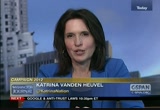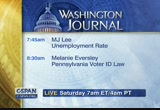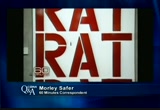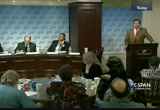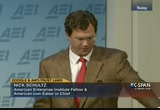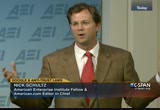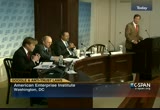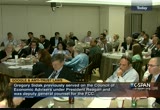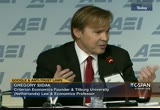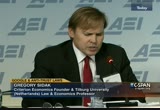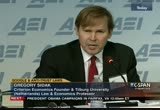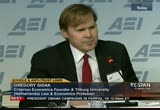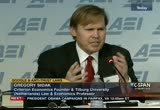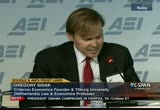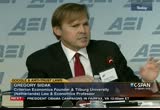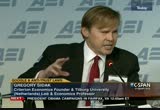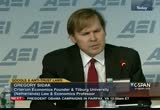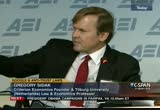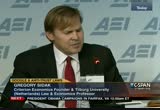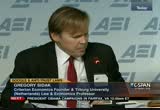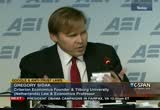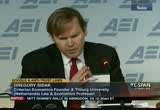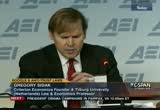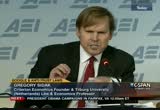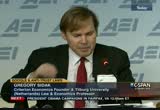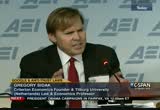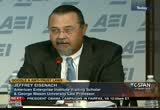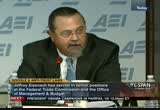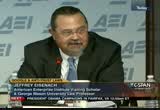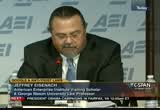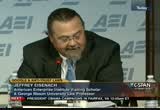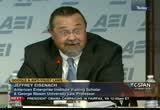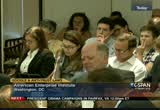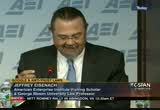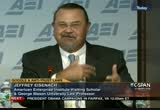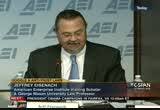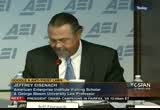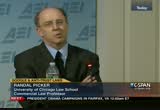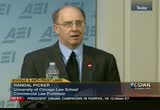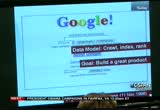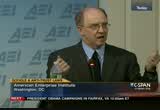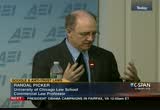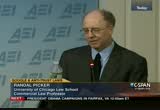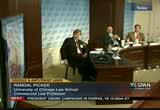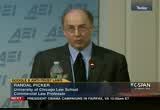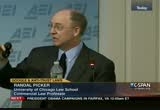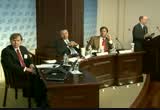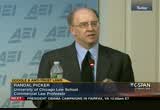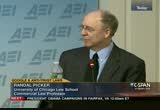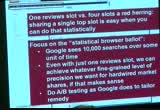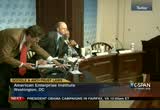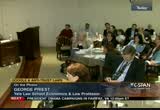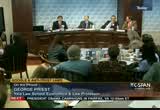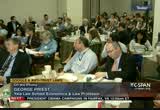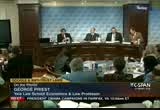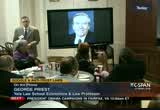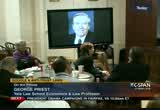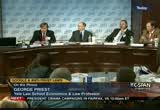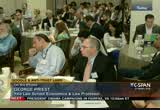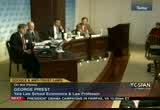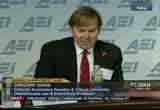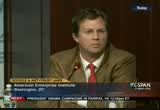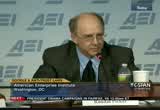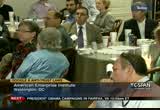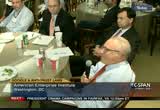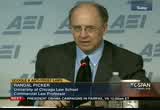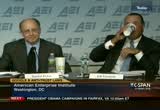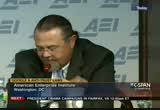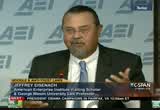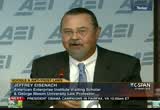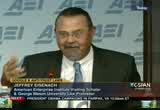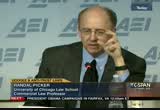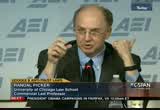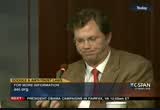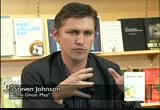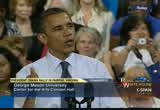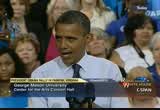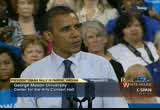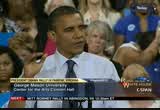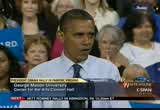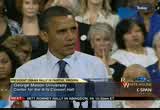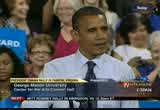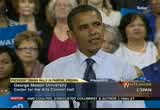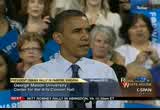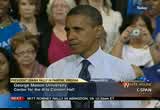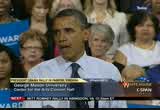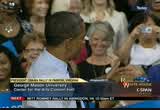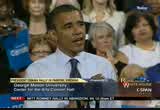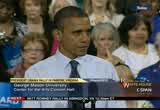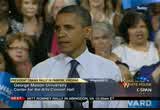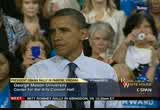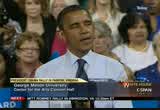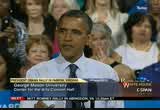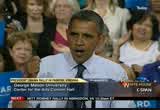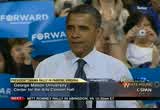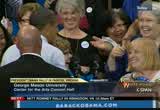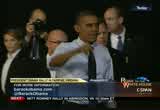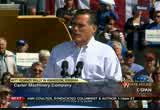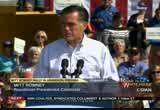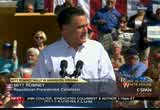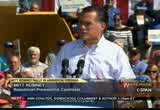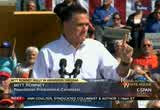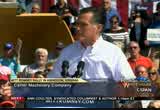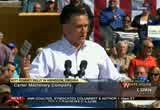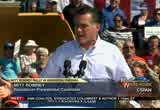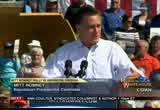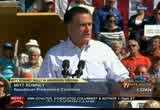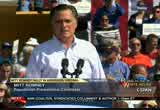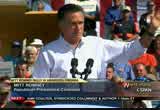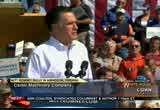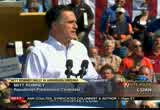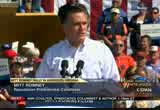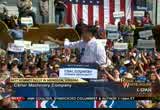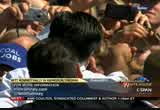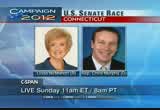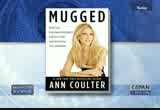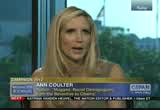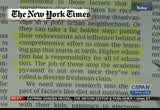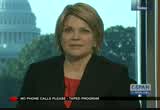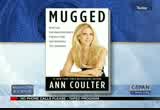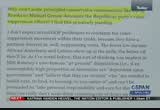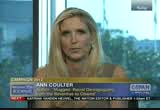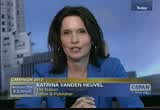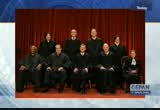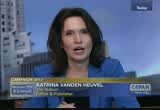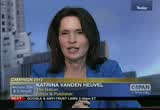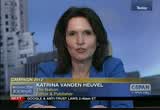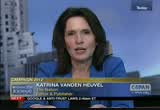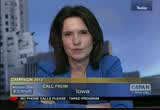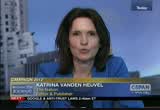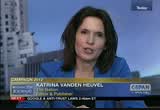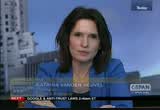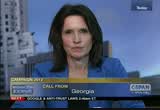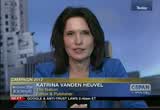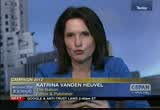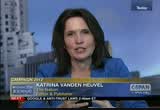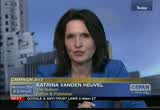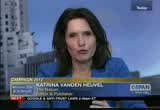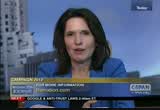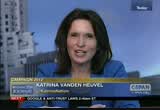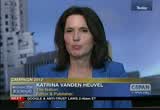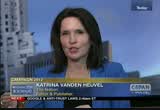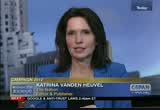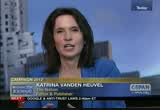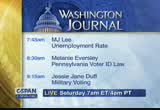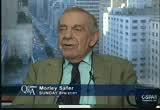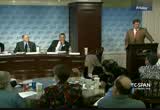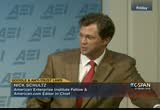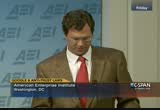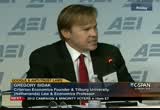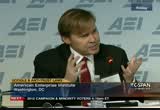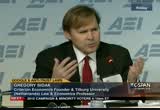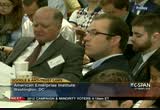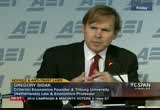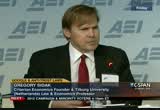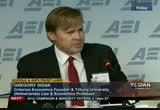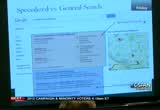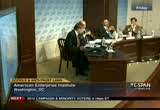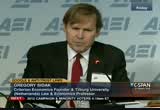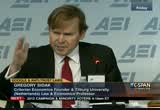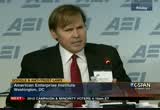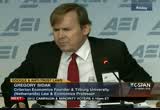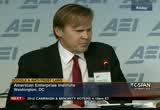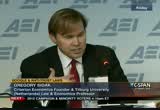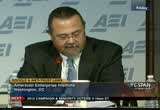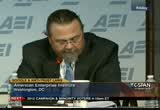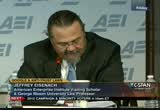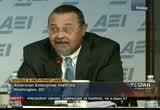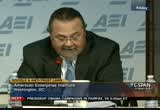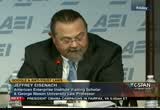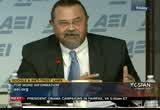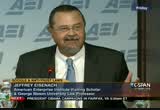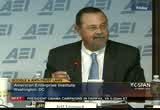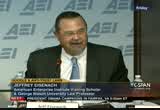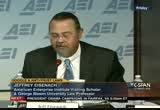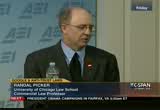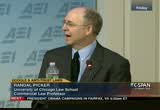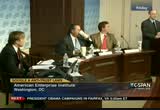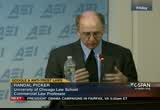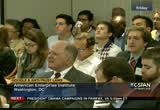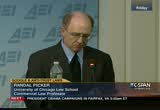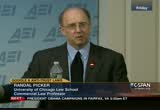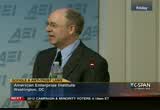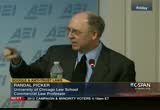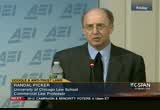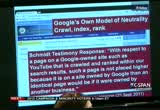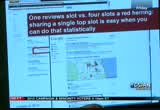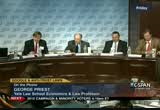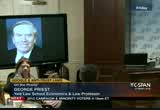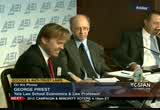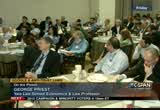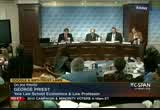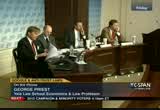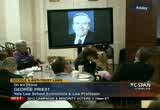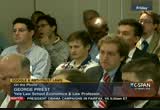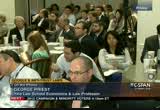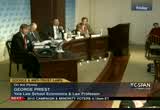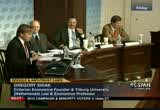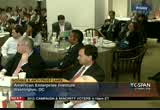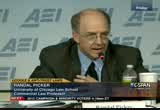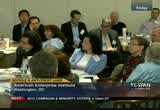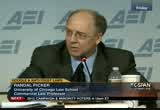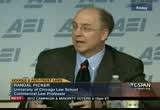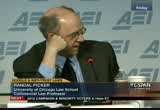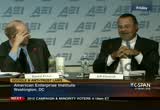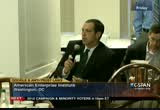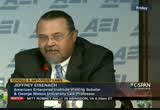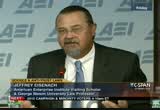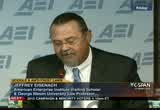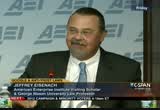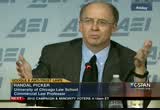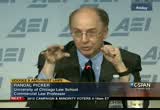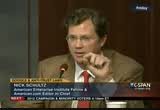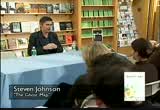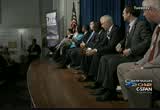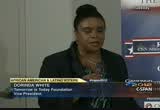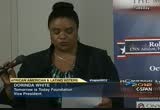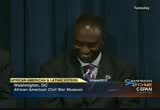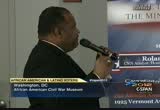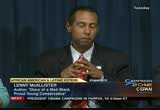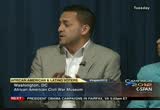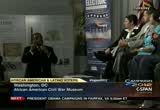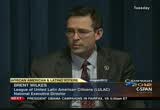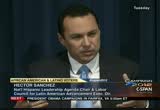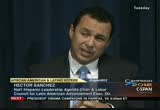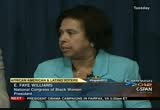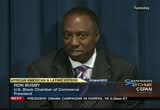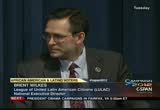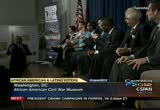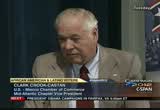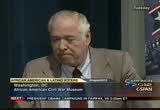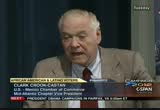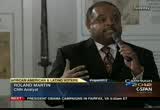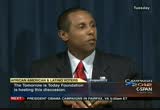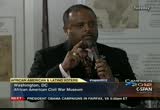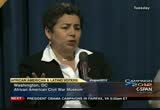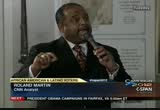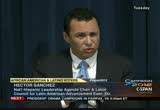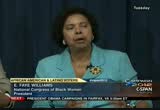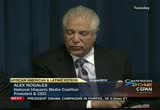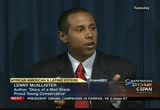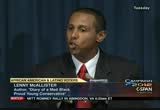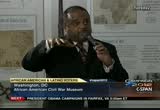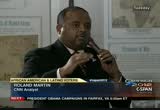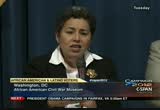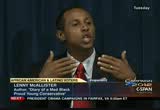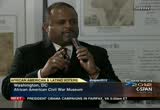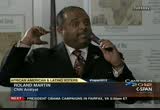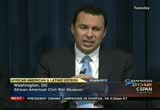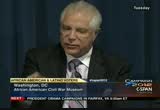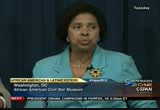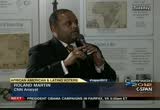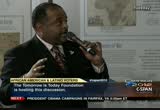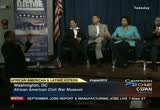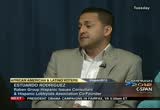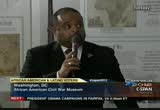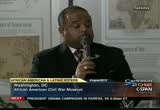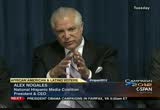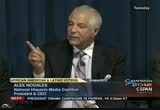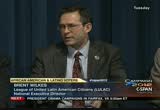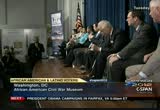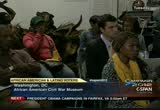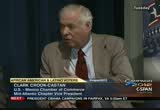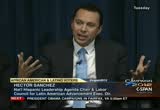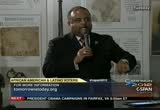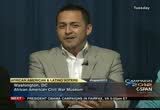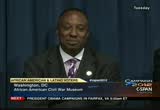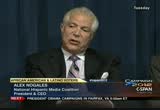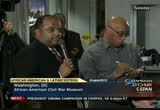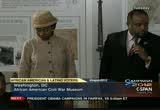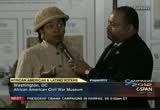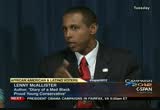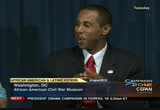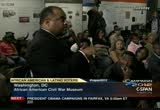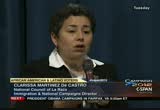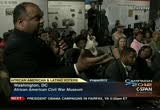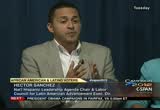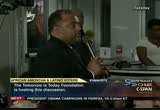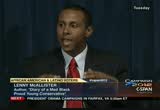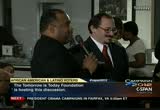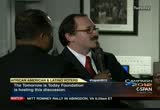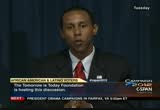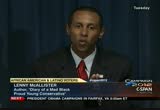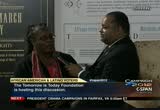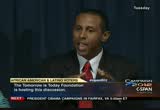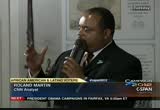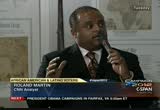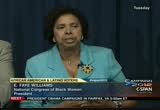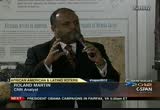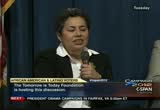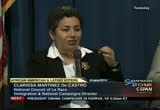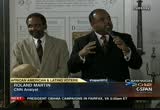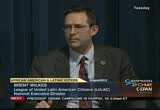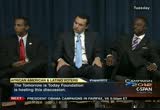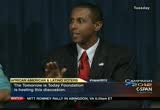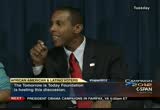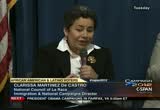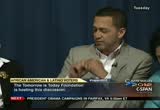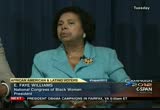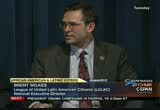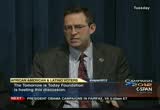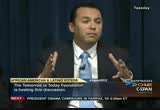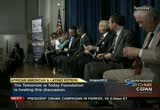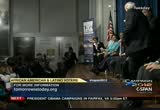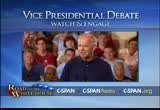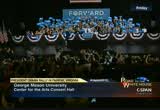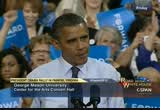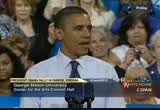tv Politics Public Policy Today CSPAN October 5, 2012 10:30pm-6:00am EDT
10:30 pm
community has stepped back and not engage with that judicial process or the courts as effectively as they could. host: there are four students on the bus who did not have an opportunity to ask a question today. would you mind if they direct tweet you a question to respond to them? guest: with pleasure and apology for my lengthy answers. @katrinanation. host: thank you so much, again, to time warner and for the professor for organizing the bus for talking to katrina vanden heuvel. thanks as always. guest: and may those students go to thenation.com and learn about our internships program. it is terrific.
10:31 pm
the head of the liberal party in the u.k., nicholas clegg, is a former intern. ? , mj lee views the latest job numbers. -- >> tomorrow, mj lee reviews the latest job numbers. and the voting process for active-duty military personnel serving in the u.s. and abroad. washington journal, live at 7:00 a.m. eastern on c-span. see the only presidential debate thursday night live on c-span, seized and radio and c-span.org. watch and engage.
10:32 pm
next, a discussion about google operations and antitrust laws. >> almost 20 years ago, we broadcast one of the most controversial stories in our 44 years on the air. it was called yes, but is it art? i was accused of being a philistia, someone lacking the esthetic ability to appreciate contemporary art. in those 20 years, works that i question worth hundreds of thousands of dollars are now worth hundreds of millions. >> what made everybody so that 20 years ago? >> i discovered something that i had absolutely could barely believe -- that when you question someone's taste in art,
10:33 pm
thanmore personal politics, religion, sexual preference. it is something that goes to the very soul when you say you b ought that? > sunday at 8:00 on c-span's q&a. now, an american enterprise institute panel discussion examining whether google is violating antitrust laws. topics included the market for internet search, and an analysis of google's business model. pedal trade commission chairman john leibovitz has said that the ftc plans to make a decision on whether to take legal action against google by the end of this year. this is about 90 minutes.
10:34 pm
>> good afternoon, everybody. but we could bring this panel session to attention. i want to thank you for joining us today. for a discussion about internet search and antitrust policy. i am nick schulz, the fellow here at the american enterprise institute and the editor of american.com, it flagship magazine. we are going to hear from gregory sidak in a minute about any paper he has. he is the chairman of criterion economics and also the ronald professor of law and economics at the tilburg university. in addition to being a
10:35 pm
distinguished author and scholar, he was the fk weirhauser in law and economics. today he will discuss a paper he is co-authoring, titled "what does the chicago school teach about internet search and the anti-trust treatment of google"" judge robert bork is a leading figure in antitrust scholarship. he is a judge to the united states court of appeals for the district of columbia and the supreme court nominee and also for many years, a fellow here at the american enterprise institute. george priest will join us by conference call. he is a professor of law and economics at yale law school.
10:36 pm
chairman ofhe aei's our council economic advisers. he was supposed to be coming down from the cornea -- la guardia and his plane got cancelled. aei was a hotbed of the regulatory research in the 1980's that lead to regulation. it looks like we have a lot of work to do still. but it is good to have george even if just on the phone. also turning us is jeff eisenach. -- joining us is jeff eisenach. he is an adjunct professor at the george mason university school of law and is visit -- and is a visiting scholar here at american enterprise institute.
10:37 pm
we are also joined by randal picker. he teaches antitrust law at the university of chicago law school. he is the co-author of game theory and the law. here is how we are going to proceed. greg will talk about 20 minutes or so about his paper. then we are going to hear from our discussion, starting with george. and then jeff and randty and greg will have little time to respond. the everyone to have a q&a at the end. -- then we want to have a q&a at the end. please turn me in welcoming gregory sidak. [applause] >> taking very much. it is a pleasure to be back here at aei. this paper -- talk based on a
10:38 pm
paper i have done with judge robert bork, a one to a knowledge mary ellen and bob jr. in the audience. this presentation and the paper it is based upon which i think will be available today if it is not already available on the web site and also on the criterion website, was commissioned by google but the views that are expressed in the conclusion that are reached in the paper are solely those of the judge and myself. the title of the paper presents this question of the chicago school perspective on questions
10:39 pm
10:40 pm
10:41 pm
of the chicago school of antitrust analysis with horizontal conspiracy cartels, it has a very hard-line attitude. cartels are serious source of injury to consumers and should be aggressively enforced against and punished. so 30 years or so ago when i was a student, i kohl offered a -- i co-authored a book. influenced -- by another person in this. he wrote on the optimal enforcement of law. his insight was when behavior as
10:42 pm
six detection with some significant probability, you have to ratchet up the penalty to offset the likelihood that the paper -- that the behavior will go undetected. in forms of behavior that are intentionally concealed, that argues for multiple damage once liability has been found. in other areas of economic behavior, where firms are cooperating with one another but not restricting output and raising prices, one of the key contributions of the chicago school is that when you see some form of business contacting, some sort of strategy or structure of organization and you do not understand it, you should not lead to the conclusion that there is some nefarious purpose.
10:43 pm
he them -- the theme is instead you look for some underlying justification before you condemn the behavior. that is a strong theme that the chicago school has imparted to american antitrust jurisprudence. we see that in a number of supreme court cases looking at joint ventures and complicated contractual relationships. and mergers are a subcategory also. finally we get to single firm conduct. the monopolization problem. here i think the chicago school also carries over this presumption that you should not condemn the behavior of a dominant firm simply because it is big.
10:44 pm
there are efficiency justification's associated with scale and scope of an enterprise. you want to be cautious that you do not end up deterring incentives for firms to accomplish those kinds of the efficient ways of organizing. along with that, over dynamic context, you do not want to create incentives for firms to refrain from and vesting in innovative activity. that set of insights plays heavily in the area of high tech and antitrust. the microsoft case now an issue being raised about google. let me share with you some great quotes from the chicago school that encapsulates these
10:45 pm
principles. here is one from frank easterbrook. "every successful competitive practice has victims. another one from judge bork -- "the sherman act was clearly presented and debated as a consumer welfare prescription." it is something judge posner wrote -- " the exclusion of any competitor reduces competition but it is not the sense of competition that is relevant to antitrust law. the policy is intended for the ultimate benefit of consumers rather than individual competitors. the consumer has no interest in the preservation of the number acquired to ensure his being able to buy at a competitive price." some of you may not know that
10:46 pm
judge posner, although frequently credited with having made major contributions to economics, was not a trained economist. he was an english literature major. i particularly like this passage from one of his cases -- "there is a special providence in of the fall of a sparrow." there is the sense that the the chicago school that the competition is a race. and any race as a winner and losers. if we do not elevate the welfare of the losers, over the welfare of the incentive beneficiaries of that process which are consumers. that is the big in sight contribution of this a couple
10:47 pm
school. -- of the chicago school. this week had an interesting conversation with an indian lawyer, the head of the delhi office of a respected law firm. there is quite a wave of development in indian antitrust law. i was talking to her about this paper i was going to be presenting and she said antitrust is not intended to protect competitors. i thought that is what we have been doing here in the united states for about 40 years or so. but it is not necessarily something that is immediately obvious when you go outside the united states, particularly in countries that do not have a well established jurisprudence. let me turn now to some of these
10:48 pm
questions regarding google. google provides a search engine for free. how does google make any money, giving something away for free? it is a two sided market. you have people want to engage in search. they want to find things quickly and effortlessly through the internet. on the other side of the market, there are advertisers who are happy to purchase advertising from google that will be presented to these consumers to reveal themselves to be interested in looking for particular things. a restaurant or a kind of car or book. the funding of the platform comes from the advertising side of the market. consumers to their part by
10:49 pm
lending their eyeballs to the screen. this is not a very different from radiobroadcasting or tv broadcasting. but it is taken to a higher level of value added in the sense that because you reveal three research what you're really looking for, advertisers are able to zero in on the potential audience for what they have to sell to a much greater extent than would ever possible before internet search developed as a business. so the interest to go has in offering its search engine to consumers is to make it as easy to use and is valuable in terms of delivering good results so that google is able to maximize the audience size for the advertisers who are paying for all this. with that as an overriding
10:50 pm
principle about how the search engine market operates, i would like to address a few of the high level questions that have, and in -- that hav come up in the current debate regarding google's behavior. i will only focus on questions that originate in the u.s. and other analyzed under u.s. antitrust law. -google's rankings of specialized search harm consumers? specialized search results highly on the page as distinguished from general search results.
10:51 pm
-google deprive competitors of 00 does google deprive competitors of -- does google the private competitors of a necessary skill? -- scale? and a related question is whether there is some kind of central facility that google has that competitors need to get access to in order to be able to compete effectively in the search market. the overriding question is, does any of this have an impact on the welfare of consumers? it may be that certain competitors and encounter a disadvantaged but does that ultimately have a harm on consumers? let me go to the slide.
10:52 pm
this particular flight gives you a screen shot. if you were entering the sort we did the search. -- entering the serach result. this result of pop up. the blue ones at the bottom are the general result. the pink area are specialized search results which actually anticipate that the person doing the search might be
10:53 pm
interested in finding a place to go by a smoothie. that information is generated and prioritize on the page so the consumer can find it easily. then a map pinpointing the particular vendors. if the question has been phrased whether this kind of placement of specialized search results is a disadvantage to competitors. there are a few points here that are worth considering. one is that this practice of imbedding specialized search results this something that is being done by google's
10:54 pm
competitors. microsoft, for example, launched bing and said to build on the benefits of today's search engines but to move beyond this experience to give users in new experience. microsoft was going to focus on four key vertical areas. the idea of providing some specialized result along with a general search results. those are making a purchase decision, planning a trip, research a health condition or finding local business. one point that judge robert bork has made it into his opinions on the circuit is that
10:55 pm
when some challenge -- i think we might have lost george. when there is some practice that is adopted by all the competitors in a marketplace, that creates a presumption that that practice is the result of competitive rivalry. that gets back to the view that you should not be -- you should not presume that practices that are new and different are armful to consumers and when you see all competitors in the market doing something, the fact that the largest armada into the market does it as well, -- firm in the market does as well. it does not necessarily create
10:56 pm
monopolistic power. in the case of the specialized search rankings, google presumably would not do this unless it believes that the results were valued by consumers. that google as a search engine becomes more valuable with the insertion of specialized results along with the general search results. because if it were something that consumers did not value, google would be reducing the potential audience size for its search engine and people would switch over to a rival. i glossed over one question i should not -- i should have mentioned. the first big picture question is is google the gateway to the
10:57 pm
internet? what are the switching costs in moving from one certification and into another? there is a bit of research now being done on this question. it seems to suggest the search costs are very low. can switch during a single session on your computer from google to bing to something else. you can use specialized vertical search engines like amazon and you can also rely on non- internet based tools to try to find things as wel. but the search costs from moving from google to bing are essentially zero. you're starting with the product provided for free. if he did not like it, you can switch to another product that is provided per free -- for free
10:58 pm
for the investment of maybe 10 or 15 seconds of navigating on the screen. when you have this kind of immediate ability to shift from one supplier to another, the fact that one company has a very large volume of searches for example, a step does not tell you anything about whether that is injuries to consumers. it suggests they have served as because consumers like the way they put together in their search results more than some alternatives available. this comes up -- the single monopoly profits pyramid that the chicago school developed which says that if you have -- if you want to think of vertical search is like this, as being something different from generalize searches -- google
10:59 pm
has market power in generalized searches and is somehow trying to monopolize specialized searches. if you have vertically related services and products, there's only so much monopoly profits that a firm can extract. if you already has a monopoly over general search, a cannot extract any more profit by trying to monopolize specialized search.' consumers in this case are bearing -- paying zero. it is not clear how that scenario would really play out. so has to be playing out on the other side of the market, on the advertising side. but the general contribution of
11:00 pm
the chicago school is that this idea of extending a monopoly does not make any sense because he already could extract all the monopoly profits and the first monopoly. you do not need to get another monopoly. i'm taking a little longer than i thought to get to my point. i think what i'm going to do is quickly talk about scale and essential facilities. the argument has been made that google, because it has such a large share of generalized search results, is denying him competing search engines the ability to achieve sufficient scale to compete. i think there are several chicago school reactions to that. one is, what is the value scale? if you look deeper into the critique of google, it is that
11:01 pm
the scale generates the ability to make enough profit to invest in having an interesting search engines of that you have a larger audience size. the you can then offered to advertisers. the first problem with that is that you do not have to finance investment in embellishing your search engine. -- solely through internally generated cash flow. you can go out and borrow money. that is a standard chicago critique of that kind of argument. the second critique goes to the basic idea of what is gayle? -- what is scale? there is a famous definition that says the -- whether scale as a barrier. a barrier to entry is something that an entrant has to pay for that the incumbent did not. but it's the incumbent also have
11:02 pm
to incur the cost, that is not a bearert to entry. with respect to the critics claiming there's not enough scale achieved to compete effectively against google, you have to dig a little deeper to see what it is they're talking about. it is not really scale. it is a team and the gives such as overtime. -- it is accumulative searches over time. anothermroe oore of what honorary chicagoan would call learning by doing. looking at how the cost of doing something is effective, not just
11:03 pm
by how many times -- how many units of output to have produced in a given period of time. the question of building air frames during world war ii, an accumulative numbers were built in the factories and ship this phenomenal principle of the declining -- and shows the and nominal principal of declining accumulative profit over time. so is there a problem, and an ability of competitive google to engage in this learning by doing? is there some inability to use the benefits derived from learning by doing to create a
11:04 pm
more robust search engine? would you have to conclude his that is not a very persuasive argument. google was knocked the first search engine -- was not the first search engine. so what we see is that a second entrant can acquire sufficient accumulative scale to be successful enough to displace the larger search engine. although google may seem a very big and well situated today, people the same thing about microsoft a decade or so ago. it has its own share of competitive rivalry. so i have no reason to think that google will not continue to face lots of competitive
11:05 pm
rivalry from innovations in search technology. i will say a few words about the doctrine. the unicorn of antitrust law. everybody thinks they know it looks like a no one has actually seen one in the class. the idea is that there is some facility that is hard to duplicate. the owner of the facility is excluding competitors from using its and there are a few other elements to the test. in a case of internet search,
11:06 pm
the asserted facility is placed on google's page. but there's only limited amount of space that can come up on the page. so it is not possible that every competitor that thinks it is essential to be on the page can be accommodated. it is not clear how such a remedy would be feasible even if he thought it was necessary to do this in order to improve competition to benefit consumers. the u.s. courts have been very reluctant to buy into the essential facilities theory. the supreme court has said it has never endorsed the idea. it is very unlikely that an antitrust claim against google
11:07 pm
would ever succeed in court. i think i better stop at this point because i have used more than my allotted share of time. if georges their -- george is there -- >> first of all, thank you 4 your speech. i think george got cut off. i am going to turn over to jeff and then we will go to randy and george can clean up once we have them back on line. >> thank you. it is an honor for me to be here. i started working on the regulation issues at the american enterprise institute in june 1979. it is great for me to be back
11:08 pm
after a long time. i think the paper that greg and judge robert bork have done is excellent. i like to use my time to expand on three aspects of the issue that i think are pertinent. all of these are aspects that the pate -- that the paper to on. but i would like to call them out and drill down a little bit. those are modularity and enter platform competition. the notion of multi-sided sidedness andltui dynamism. the paper is correct to express skepticism about applying
11:09 pm
traditional approach to market definition in high-tech markets. i question how useful it is to think of jubal's certification competing against microsoft -- google's search competing against microsoft as if specialized search [unintelligible] at the committee more useful to think of search as a complementary employed. it's a much broader markets where internet platforms compete to compete complex arrays of services which are consumed jointly by consumers. i am talking about competition among platforms. for google, search as the markey product. but google also is operating systems, e commerce, maps and so on and so forth. for apple grow -- for apple, the
11:10 pm
marquee product is devices. it also does search, siri, content, e commerce and so on. maps now. not very well, i guess. 5.0.stillo on microsoft -- for amazon, it is e commerce but they both did the other things as well. we can go on and talk about facebook and ebay and so on and so forth. all these competing platforms. these platforms compete with one another on multiple dimensions. it seems clear that each and all of them discipline the market conduct of all the others. it is open to question whether modern economics has the tools or the language to assess inner
11:11 pm
platform competition. but i think we do know enough to a lease conclude that focusing on market shares in the market for universal search is not going to tell us much about the competitive dynamics of how prices and quality is get determined for any of these. in antitrust when you define markets incorrectly, you tend to get questionable results or worse. i will take one of the sample -- example. at least partly on the theory that it would raise concentration in the market for certification, was the actual affect to preserve competition in the market for search engines? or was it to reduce competition in the market for on-line content and e, spot forms? a question for another day. multi-sidedness. the markets at issue here are
11:12 pm
multi cited. one of their primary economic characteristics is to bring advertisers together with content producers, publishers, consumers and so forth. it makes no sense in such markets to talk about separate markets for each customer group. if we are talking about heterosexuals dating services, they do compete for men and women customers but it does not make any sense to talk about separate markets for men and women. and by the same token, it makes no sense to talk about separate market for consumer search, search contest-- content and advertising. both the demand and supply are
11:13 pm
interrelated. the cost side and the demand side and valuation side. the biggest implications for antitrust analysis in this market is there is no direct relationship between any empirical measure of cost on the one hand and a competitive price on the other. since market power in the traditional antitrust analysis is defined as the ability to raise prices above cost, we define market power as the ability of a firm to raise prices above the competitive price. which is usually defined in terms of cost. discreet fundamental challenges, especially if one thinks a demonstration of harm to consumer welfare ought to be part of antitrust liability into a monopolization case, which most people think should be an element.
11:14 pm
dynamism. the paper correctly emphasizes the importance of it in these markets. it is useful to think about it senses. to -- two first and second - first in the certain sense. invest, innovate, differentiate. what we see our firms making risky investments in new products designed specifically for the purpose of creating a form of market power which is the ability to earn marches and excessive costs and earn back their investment. the whole point of the exercise is to make a risky investment, innovate, create something new and different. by doing so, different it --
11:15 pm
different shade my product and earn my place where consumers will come to me and pay me. and having done that, be able to charge prices above cost and earn back the investment i made at the beginning of the process. if i do that, someone will give me more money and maybe i can do it again. that power, the power that comes out of those investments in that product differentiation is the secret sauce in a meaningful sense. of the innovation economy. in the case of google, specialized search looked like such an innovation. product improvement that differentiate google's offering allows it to monetize its investment. we should be cautious about condemning such conduct for fear of discouraging precisely such innovation.
11:16 pm
the second sense i in secondt is -- in which is is relevant is in the more colloquial term. the colloquial sense of things changing quickly. when most people think about dynamism, most are thinking about things change fast. that issue. but the first census also extremely -- sense is also extremely important. the risk here lies the decree 88 effect of property in the status quo. every effort manufacturers -- for manufacturers to prevent car makers to move on to cassette
11:17 pm
because they have advanced after all. or buggy many factors to discourage carriage makers to moving on to cars. because there goes my market and i invested in good faith on the notion that carriages will continue to be made. or for travel websites, to have a defective right in a particular piece of real estate. i think the paper as absolutely right to call attention to the dangers of living towards such a course in which we are inhibiting innovation and creating a defacto property right for the status quo which could also harm innovation. let me close by saying that
11:18 pm
cases like this one ultimately -- it is not clear that all the facts are in. more facts will become apparent. but i think they have helped set the analytical standard by which the facts will and should be judged. and to note that it is and ought to be a high bar to defining antitrust liability. thank you. >> thank you very much. randy will bring you up. ma you are doing that, i may try to get george back on the line. the floor is yours eric >> thank you. what a wonderful topic. an interesting, thoughtful
11:19 pm
paper. the discussion of a sitcom -- secaucus' school resonated with me. i have three degrees from the university of chicago. i took price serious and what i learned is you start these situations withtwo premises -- people optimize subject to constraint and markets clear. that is where you want to start. that is the core of economic analysis and chicago school antitrust analysis. i also have -- i could talk a seminar -- i co taught a seminar on collective action. we ought to look at the facts very carefully. mahmoud but it would take as 100 years to do that. -- ronald thought it would take
11:20 pm
100 years to do that. i think he hoped to complete that study. he is aging but aging remarkably well. so let's talk about the issues they raise. where i want to start is with media markets and how markets our exercise media markets. google was compared to radio and tv and i think that is the right thing to do. i start with you will. google -- this is the original home page that they launched. if you're looking carefully, it was a much more excitable company in those days. there is an! at the end of google. the data model, they are in a transition in how they approach
11:21 pm
data. the model was this idea they would send out to look at the web and websites, to index that and rank them and return the search results. the algorithm that larry page invented was the heart of that. that is the data model they start with. what google did is what you hope companies will do. they went out and they built a great product. and that is what we want to see people do. the absolute best way to acquire market power, the ability to set prices above cost, the best way to acquire that market power is to build a great product. to differentiate yourself from your competitors and have a sustainable quality gap between you and your competitors.
11:22 pm
if that is what you do, you can have market power. u.s. antitrust law says that is great. we encourage you to go out into the marketplace and succeed. as long as you're doing that legitimately, you are fine. you are entitled to such high prices. and to earn the just rewards that flow from that. this is a picture of lucille ball in the early days of her television show. it is hard to imagine that she had a market share in 1961 of 67.3%. 2 out of 3 households were watching her show. how the exercise market power in these situations? and this is an environment. the radio and tv environment, much like the search engine
11:23 pm
environment, where competition is always a click away. it was not a mouse click away. but competition was always a click away. you did not have to pay to switch. it was easy to switch in those situations. you might see how to market exercise power art to mark the answer is as the exercise market power to the volume and intensity of advertising, advertising is how you make money and the volume of advertising is how you do is how much money you can make. it is easy to start by thanking we did there is a lot of discussion about whether google has market power in the advertising market. that is not the place to start. the place to start is in search engine. a company with a great, successful product. but the company have market power? if they did, how would they go about exercising that? the answer is they would have more advertising. and because ads are a utility
11:24 pm
for consumers, consumers are not getting the content for free. they are getting the content by bearing the costs of that. i tried this the other day. i went to the forbes website. the first thing that happens there is the present and ad. now they do that because that's how you make money. the essence of media advertising is you degrade the product to make money. no one thinks the best way to tell stories is to build up to a great suspense and then stop for five minutes to sell tacos. but they do it because that is the way they can monetize the story. they are not necessarily interested in the to the quality of the product of what they can monetize. but they are allowed to do in these circumstances does have lots of advertising. you have immediate power monopoly, you get to have lots of advertising.
11:25 pm
u.s. antitrust law says that is perfectly fine. when you are not allow to do is to spend that market power to maintain that power or to acquire power. that is what we need to focus on. we need to look of the advertising prices that google is implicitly charging to use the service. that is what i spent the summer doing. i learned how to do a little python programming. it is the language that runs youtube. so i'm dangerous now. that is what i've done. and i studied chicago. i run lot of searches on the 77 communities that make up chicago, that includeshye park. i run slot the search is on -- lots of searches on bing, and google.
11:26 pm
370,000 links. that is what i have been looking at. the question is what do we see there? i kept the price which is in some sense and number of advertising links/the number of organic link. i use that to calibrate how much advertising. that is crude. there are some limitations associated with it. how about the size of the ads, where are the place? but this is what i calculate. it is interesting for a number of reasons. if you ask who is inflicting the highest intensity of ads on customers, it is actually yahoo and bing and google have interesting differences. that is the path we need to go down. i do not think we should think of this as a free product but a media product where they are charging advertising prices. someone was caught the
11:27 pm
adventures should be exploiting that quality advantage by trying to dig charging higher intensity prices. greg talked about these design choices. i have the same kind of pace. i spent the summer searching for good restaurants in hyde park. if you have been there, you know that is a tough start. we got our chemical examine what that looks like. links were we do not see. there are competitive. it is not driven by money or hardwiring. them have competition with regard to advertising. auction. dollars. i am a google advertiser, i am competing in options right now as i speak, i assume. those are the kinds of things you're very familiar with. do not lose sight of the hardwiring going on as well. at the top of that, there is a hard wired link to google property. that is the youtube link. then we get to here.
11:28 pm
the one box google refers to. this step in the evolution of stars. -- of search. what they are focus on is the ties, the links to the google review by the google plus side. -- plus site. is it the hard wired link ec for youtube and maps? maybe? when they chase google, my space, facebook, they do have search anting guidelines -- search engine guidelines. google review but that show up there do not seem to attract -- attract the quality of the google reviews.
11:29 pm
you can count the number of reviews. comp u will be much more aggressive on this. you can take your browser, take firefox, and say i'm going to act as if i am internet explorer 6. if you do that, this is what google gives you. they give you a choice of a review sites. i think what google recognizes is that we are moving into a situation where social is going to be very important research. these peer to peer connections. that is not a space in which google has been strong. they have to figure out how the move from the space in which they have been strong to a space in which they are seemingly much weaker. they seem to be doing that
11:31 pm
is in situations where google has lots of its own links, and the only way google has lots of its own links is if they embed those links in the way that they're doing in the one box. and those situations, they seem to have less advertising. they seem to be exercising the market power, not through the advertising which would be a completely legitimate exercise. but they seem to be substituting out of that into -- into the google share links. all right. so i'm going to run out of time here. i want to talk about remedies quickly. i'm going to skip that slide but i think that's really important. google is doing stuff that's important and legitimate in figuring out how we allow products to evolve which i heard jeff asking. that's an important question. focus on what google does with youtube. so eric schmidt was very clear in that in his senate testimony response. they treat youtube as an outside property. they crawl, index and rank, right? that's what they could be doing with regard to google plus. they don't seem to be doing that. the browser ballot.
11:32 pm
if you haven't seen the browser ballot in the e.u. this is what happens when you turn on a windows seven machine and the first time in the e.u. you get a choice of browsers. that was resolution that came out of an e.u. case against -- against microsoft. there's some discussion in the paper that we can't share the top link. because after all only one top link. i think that's wrong. right? we can share it very much in a statistical sense, right? when google sees 10,000 searches for hyde park restaurants, it can return at whatever fine level of granularity we want. searches that this search is going to be linked to yelp reviews and this search will be linked to google reviews. we can do that at whatever level of granularity we want to if we don't think that every search return has to be the same. so i think the remedy issue here if we want to go down that path, and i have questions about that. questions about what the e.u. has done with regard to the browser ballot. but i think it's an interesting path. and i think there are possible remedies here if indeed we think there's a problem.
11:33 pm
i don't know whether there's a problem here. but i think there's an interesting discussion that we can have. i'll stop there. >> thank you. >> bear with me here. i'm going to try to bring up our good friend. all right, george. how are you doing? >> i'm doing great. but i don't see mick. >> george? >> am i on now? >> the floor is yours if you want to give your remarks. >> thank you very much for your
11:34 pm
-- ok. thank you very much. i'm sorry for this trouble. thank you for your very kind introduction of my empty seat. i'm very sorry i'm not there. the washington-new york shuttle is usually pretty reliable. it may be the new regulation. i don't know. only 20 people at the gate for the 10:00 shuttle. it may have something to do with it. at any rate, i'm very -- again, sorry not to be there. but i'm happy to be able to participate. google wanted me to state that some time ago, i served in a very small way as a consultant to google. they wanted me to say that. they didn't want me to go on and say they essentially fired me or laid me off. at any rate i'm no longer a consultant for google and these comments have nothing to do with any consultancy for google.
11:35 pm
first, i found the paper very helpful. very helpful in explaining how google works, what the nature of the market is, what the various mcnisms available for competitors against google are. it's paper and i recommend it to all of you in the audience. i've been watching this session on c-span and they -- the panelists are good. but they spend a lot of time showing the audience. so i think i've seen all of you in the audience. and i'm looking -- right now on c-span is showing the audience. so it's been great. and you didn't even get me a seat. they got a side camera that shows there is no seat there. you took the seat away. at any rate, the paper is very helpful in that regard. i think it's thorough. very useful for thinking about the various criticisms that goosm's competitors and others
11:36 pm
-- google's competitors and verse have made about google. i urge you all to read it. i have one principal criticism of the paper. and i hesitate -- i really hesitate to criticize the paper by bob bork and you, greg, on these grounds. bob bork is a good friend. his family are friends. and mary ellen they've been showing you on c-span a good deal of the time. bob was a predecessor of mine in the chicago law and economics and a predecessor of mine at teaching antitrust at yale law school. my principal criticism of the paper is that it's not chicago 's school enough. it makes a good shot at it but just really not chicago -- the paper does a good job of knocking down the arguments made by google's competitors. the paper gives those arguments and the competitors too much credit by taking them as
11:37 pm
seriously as it does. and especially by relying on empirical evidence to show that the competitors' criticisms are wrong or are outweighed by other competitive considerations. and let me give you a principal example of this. most of you haven't read the paper but i'm going to read from -- this is the top of page 13. and greg talked about this in his comments. it reads, the first sentence, antitrust intervention could be justified only if top placement on a google search page is an essential facility. that goes on to say none of the four conditions of the essential facilities doctrine is met. and then the paper goes on in many pages to explain that. now, this is an excellent discussion of the essential facilities doctrine. and of these various conditions, control of the facility by the monopolist. the competitors' inability to duplicate the facility.
11:38 pm
the use of the facility to competitors. and so forth. feasibility of a remedy. each of those individual discussions is excellent. but it misses the larger point. and this i think is central to the chicago school view of the world. and that is that the concept of essential facility is incoherent. that there's not that a lot of literature from the chicago school on essential facilities, greg, you got an excellent article on the -- at stanford on the subject. maybe the best writing is scalia in the treko case. but the chicago school point basically is that if a facility has become essential, and this can be said of google, i think, because it succeeded on its merits, not in a legal sense but it's a central facility, but if it's become essential it's because it succeeded on the merits.
11:39 pm
in the context of single firm conduct to succeed on the merits is what we want from competition. indeed, it's contradictory to the ambition of competition to attempt to regulate success on the merits of that nature. now, it's different whether there's a government grant, where the market power derives from political authority. and that's true of some of the essential facility cases. stadiums, stadium approvals and the like. but if the facility has become essential through market processes, which is surely the case of google, it represents success. and that firm is entitled to all the reward it can gain. now, greg and bob do a terrific job of showing why the google experience does not fit the scraps of law on essential facilities. but i think they should go further. they should deny that there's any merit to the concept at
11:40 pm
all. now, i think this is true of other parts of the paper. as i alluded to earlier, much of the paper is empirical. and i learned a lot from it really. there's a lot of detail in it. and i learned a lot. but the -- those responses and that empirical -- making the point that criticism by competitors of google's practices are just wrong on the facts. but i think that that's not enough. especially in representing the chicago school. the failings of the arguments by google's competitors against goosm's are deeper. and this is the essential chicago school point. they are analytically unsupportable. now, greg has made this point and he made it both in the paper and in his remarks this morning. but i think they deserve -- this point deserves further emphasis. and it seems to me to be the central point. there are two principal facts i
11:41 pm
think dispositive for evaluating the google position and the google practice. first as greg mentioned but i think it's a critical point, the search services are given free to consumers. so where's the consumer harm? the search service is given free. and the second and related point is that google's search services, under general search or specialized search, are in competition with many other search engines at both the general and specialized level. which are also given free to consumers. now, these points seem to be dispositive of the evaluation of google. and i think essential to the chicago school evaluation of google. all of the detail in the paper and the facts, highly interesting, highly relevant, important to read. as i say, i've learned a lot. but i think it's a simpler case. these points are dispositive. now, years ago, i made a -- a
11:42 pm
decade ago, i made the same argument with regard to microsoft. internet explorer which was given away free. bob bork and i differed somewhat on that count. and i haven't seen a footnote indicating a reconciliation or whether he's changed his mind or whether there's some difference here. but i think that would be useful. because bob bork's criticism of microsoft was very important, i think, in the ultimate resolution of the case. but i think for the evaluation of google, these two facts, dispositive facts, and -- should end from the chicago school view, should end the discussion. google's large market share is a result of superior -- of a superior product that they've created. that has been revealed by the market through the share of advertisers and also of
11:43 pm
consumers that google has. and that's -- that's -- should be the end of the story. that is, the dominance of google -- and it's a fragile dominance. as greg pointed out, several -- the clerk, puts you on a different search page. but the current market share, however defined, that google has, has been gained on the merits, and deservedly so. that i think is the chicago -- ultimate chicago school conclusion. >> so we don't get any feedback. so greg, i want to have time for a question so i'll give you just a couple of minutes if you want to respond to anything that jeff or george or randy said. open it up for questions.
11:44 pm
>> i'll be very brief. i thought that jeff's comments were very helpful in terms of putting it in sharper focus, particularly the points on the dynamic aspects of the market. and i appreciate that. i think randy's research sounds fascinating. i look forward to seeing the paper when it's ready. >> don't we all. >> and i appreciate george's comments about attacking the ideas at the -- i'll call it the level of theory as opposed to the level compared. and also it's a real rarity when i don't feel i'm on a panel to make everybody else sound reasonable. so thank you, george, for that. beyond, that though, i won't take up more time. because i imagine there are good questions in the audience. >> ok. we're at question time. so if you just raise your hands
11:45 pm
and just a couple of ground rules. we have i believe some microphones that are coming around. so when you're called upon, please wait for the microphone. if you could just identify yourself, then also please make your question in the form of a question. so we have one right down here. >> thank you. i'm alexander octone of the business rights center. and the question i have is actually for randy. you gave the example -- excuse me -- of old fashioned television broadcasting where the advertising really detracts from the product. and based on that, you said that's the price the consumer is paying. but when i run a google search, the one box, the advertising, everything on that page except maybe you could say the bar at the top with google's other products is geared toward meeting the need i've expressed
11:46 pm
by my search inquiry. so i would ask you why do you approach the advertising in that context as being a price rather than as being a different kind of service to the consumer? >> sure. a couple of things on that. we know that the ads are there, not because they're the ads the consumer most wants to see, right? we know they're there because that's how i paid to get on the page, right? presumably i wouldn't pay to get on the page if i was getting there organically so a change in the approach to competition. but those links are by construction necessarily less valuable than the organic links. so -- and then the question is, what limits, if you think there's no disutility associated with ads they should have page after page of ads. maybe that's what they got and maybe that's what -- what yao has. but i don't think that's the common experience of the ads or the common experience of advertising generally. i agree that's interesting.
11:47 pm
and if you think that, and i talked about it in the draft to come, i think that changes the analysis. so i agree with that. >> ok. we have a question right here. yes. >> my name is -- the question for greg. you mentioned zero switching costs. if i went from google to being -- my understanding is that google stores information about your past searches to help get a better search. so if i use the term "washington" and i live here, it guesses that i'm looking for d.c., not the state of washington. or i look for lots of -- certain type of wines. it customizes the search. taking into account the knowledge it has. wouldn't that be somewhat of a switching cost? >> that's a fair point. >> that's a fair point that you make. that would get into -- fairly
11:48 pm
empirical analysis of how quickly the volume of your own individual searches reveals your interests and preferences successful to replicate the precision of search that you had before. my own casual experience, though, is that -- when i switch from google to bing, for example, bing seems to intuit pretty quickly what i'm looking tore. but i agree that it's something that -- that you can try to measure. it seems like the sort of thing that would probably require a computer scientist more than economist, though. >> ok. a question from this gentleman.
11:49 pm
just wait for a microphone and identify yourself. >> hi. my name is david baltam. my question is for randy. randy, if you return to your comment on your last slide about remedy, i'm wondering about what exact remedy you're suggesting and so it might be possible, when you first start your operating system, in europe, to go and choose between four options, you know, isn't this suggestion a lot more difficult from a practical perspective when you're talking about what gets placed at the top of a search inquiry? >> so i think the answer to that is no. so what google does daily, all the time, is they're constantly engaging in what they call a.b. testing. so they're constantly saying if we do this search response this way, what happens? if we do this search response this way, what happens? and they contrast those.
11:50 pm
and so the possibility of approaching this not as a one-time situation, but approaching it statistically, and actually seeing and observing the responses, if we put yelp here, does that change the behavior? if we put a link to bing here, does that change behavior? and observing that over a lot of searches? that's actually it seems to me a rich space. i have questions about the whole browser ballot approach. let's be clear on that, right? and when you ask -- that's going to be a live legal issue given the problems microsoft has with the browser ballots. i have question about that. and i see a response to is this instinctive response which says there's only one top slot. there's nothing to be done about it. over many searches statistically that's not true. the question is how do we exploit is that? how do you put the top four and aren't you doing precisely -- aren't you entering precisely
11:51 pm
into the problem with the status quo? you can only pick them on the basis of some empirical measure of who's entitled. >> right. >> you have defined in one case on property rights in microsoft, and in case on the google screen. >> the browser ballot case, they have 14 browsers, in that ballot. >> i didn't know there were 14 browsers. >> it seems to me what you will have to do is evolve that remedy as you see effectively, people competing to be in those slots. i don't think you want to entrench that. you clearly don't want to do that. right? but there are other spots for competition. that was your point, right? i don't disagree with that. that's where the e.u. will have
11:52 pm
to be. >> i think the concern is can you -- can you design that algorithm in a way that's not -- doesn't -- where it isn't a foregone conclusion. if you're sont list, you got an advantage, if you aren't on the list, you don't. inherently biased. >> the algorithm designers are probably not the law professors, the economists. >> doing pretty well. >> thanks. >> ok. we have other questions. don't be bashful. i'll ask greg a question. based on something that jeff indicated which is that there are facts that could conceivably come out that could change one's perception of whether or not there are antitrust problems.
11:53 pm
as you were doing your research and going through this, were the things that you said, well, it would be useful for me to know, x, y or z and know if that was going to be a problem or envision things that would raise -- that the antitrust bar would be hurtled? >> i think -- the way to answer your question is the issues that i thought that judge bork and i thought were most important are the ones that we outlined in the paper. so beyond those, it's hard for us to anticipate technological issues or issues relating to the design of software and the like. i do think that maybe to bring it back down to law and
11:54 pm
economics, i think that the question of remedies is one where it's possible to ask, are there additional facts that might bear on the feasibility or the infeasibility of certain kinds of remedies working at all? i'm particularly concerned about the design of a remedy that envisions some obligation for google or the next google to provide some kind of service for which there's no consumer demand. simply because the regulators thought that that is what was necessary to compel the company to do. and there was certainly that problem with some of the e.u. remedies with respect to microsoft. and the bridge to know where.
11:55 pm
>> yeah. if you've never seen the numbers on -- as you may know on the e.u. side, when they -- when there was a case about the windows media player, and they required microsoft to issue two versions of windows, one without the media player and one with it, it's amazing the number of decimal points you need to go out before you see any market traction on the one without. so a completely failed remedy. that's public. where we are in the browser ballot is to my knowledge not public. >> ok. great. do we have other hands raised back here? could you just wait for a microphone? it should be coming around any minute. there you go. >> thank you, nick. my name is kent glassman and i wanted to pick up on a theme that jeff announced for us about dynamism and ask why is it that we don't see new entrants? if one answers that question, might be because there's market power. there might be other answers.
11:56 pm
and perhaps just the discussion of platform composition as part of that answer. but i wonder why we do not have awareness of these 14 browsers and searches. and these different platforms. it seems that there's two or three but no new entrants. >> greg or jeff? >> well, i'll go first and also want to weigh in on the last question very differently. but in -- in markets like the markets that we're talking about here, almost invariably you have a dominant forum. and a fellow named i believe jonathan etro has done some really interesting research in europe over the past couple of years which direct people to and looking at concept called stackleberg equilibrium and how that applies in markets like this.
11:57 pm
but the essence of it is that when you have economies of scale and network effects, the amount of variety that you're going to have in the market at any given time is a function of -- of hetrogenous on the production side. and we have had two significant operating system providers in the u.s. for 20 years. apple and microsoft. their market share is -- apple is now rising a little bit but have been remarkably stable. why didn't we go to one? we didn't go to one because apple was able to distinguish itself sufficiently. that for some subset of consumers, it was sufficiently superior, that even though it didn't enjoy all the network effects that were enjoyed by microsoft in terms of size and applications and so forth, and economies of scale, it was nevertheless able to persist because of the value proposition of some specialized capabilities, editing being one
11:58 pm
of them, ease of use, immunity to or apparent immunity to viruses and so forth being distinguishing characteristics important to some people, less to others. why don't you see more entry? why don't you see more churn, changes in market leadership? there, i would refer you to etro. but the essence of it is that it turns out that market leaders do innovate rapidly. and they have something of great value. they realize they got something of great value. and they're under a lot of pressure to continue innovating and when they fail to do so, american online is one example of going down, and once you get on top of the mountain, it's easier to stay there. and if i can back up and just briefly talk about this other question, is there any set of facts? i came down on a different side from where george and i'm not sure where everybody up here came down. on the microsoft case. and if you want to envision at least envision what is a
11:59 pm
different set of facts look like, go back and read judge jackson's decision on the facts. in the microsoft case. and what you will find, you can agree with it or disagree with it. but what you will find, what he concluded, is that there was a range of behavior, well beyond just tying the browser, a range of behavior all of which fits squarely into the pattern of conduct which generated no value for consumers, had no legitimate business purpose, and was scomplistly based on the inside documents that microsoft at the time designed to harm competitors who microsoft thought had a chance of knocking it off the mountain. so maybe that's enough for an antitrust violation or not. judge jackson concluded that it was. but it's not -- at this point, none of those facts are in evidence. in this case. and i would encourage you to go back and read it because it's a pile of facts that -- a lot of us didn't get over that hump very easily. but when you read that pime of facts, at some point i thought that became compelling.
12:00 am
>> a number of things. that was all so interesting. i'll start with one. there is some direct market entry in this space. i don't know how important it is. the paper talks about it which is -- they're getting millions of searches and playing very different strategies. it is sort of looking at. i think where the truth of the matter is is where we see the interesting and tray that matters, and a related agistment market. that is what they take the steps they did. we know how that played up. we all use windows media player today and carried our zooms, right? apple was able to enter an
12:01 am
adjacent place. the point of where adjacent market entry takes place is a critical point where i trust because it is said to -- it is hard to get into the market. if he go back and read the bill gates' memo, i teach that on my antitrust a cheer. he understood there was a powerful entry in the adjacent market that put them at risk. that is what he found. the parallel here if there is one is the idea that search will evolve toward answers. that is what great described. that is what we think is going on. the adjacent markets spot of entry is on the social side. that is the spot where google has not been very strong. the parallel is google is trying to take its traditional position of search and move it into the
12:02 am
adjacent market, arguably what we saw with internet explorer. >> i want to add that there is an incredibly disruptive competitive the fact -- the fact as firms like apple and a google ad functionality to their platform. it was previously on a stand- alone manufacturer. look what happened to e recording music industry for example. i think is so important not to lose sight of how that can be a significant kind of innovation as to itself. not just some new technology but the inside of adding music with an ipod. you have a device that
12:03 am
generates consumer value that did not exist before. >> we are out of time. i want to thank you for joining us today. i know we made copies available to people. we will have a link of it at the web page. you can also find it at criterioneconomics.com. thank you for joining us. thank you. [applause] [captions copyright national cable satellite corp. 2012] [captioning performed by national captioning institute] >> see the only bus president debate live on c-span, suspend radio, and c-span.org. our road to the white house continues with president obama and mitt romney. both in virginia.
12:04 am
in a conversation with a syndicated columnist and author ann coulter. >> this is the first book i have written where there is a story line running through it. it is a true story about 10 days in london in 1854. it is a story of incredibly terrifying outbreaks that took place during this period. the first half of the book is really quite sobering and frightening in some ways as the outbreak devastates a neighborhood. it also turns into being a much more optimistic story. the events of this stretch of time turns out to be central to solving the riddle of where the cholera was coming from. setting of the series of public health initiatives and also other strategies to eliminating
12:05 am
colorado as a throw from london and other cities around the world. >> steven johnson is our guest on sunday. the director of a books will look at science history, the cyberworld, popular culture, live at noon eastern on book tv on c-span 2. >> the bureau of labor statistics has announced the unemployment rate has dropped from 8.1% to 7.8% in september, the lowest level since january 2009. president obama spoken by the job picture at this venue at george mason university. it is about 30 minutes. >> hello, everybody! [cheers and applause]
12:06 am
hello, george mason! hello, patriots! [cheers and applause] good to see you guys. thank you. thank you. [cheers and applause] thank you! thank you. thank you so much. thank you. [cheers and applause] thank you. everybody, have a seat. have a seat. thank you. well, it is good to be here. i am so proud to have katherine's support.
12:07 am
can you give her a big round of applause for that great introduction. [applause] it's also good to know that we've got the former governor and next united states senator from the commonwealth of virginia, tim kaine! and your congressman, jerry conley. [cheers] and good to see all of you. so one month. just one month from tomorrow, virginia, you're going to step into a voting booth, and you are going to have a very big choice to make. i know folks in this crowd may have already made some decisions. [cheers]
12:08 am
but for the undecideds that are here as well as those who are watching today, i said this before, this is a choice not just between two candidates or two parties but a choice between two fundamentally different visions for america. and today, i believe that as a nation, we are moving forward again. we're moving forward. [applause] after losing about 800,000 jobs a month when i took office, our businesses have now added 5.2 million new jobs over the past 2 1/2 years. [applause] this morning, we found out that the unemployment rate has fallen to its lowest level since i took office. [cheers]
12:09 am
more americans entered the work force, more people are getting jobs. now, every month reminds us that we've still got too many of our friends and neighbors who are looking for work. and there are too many middle class families that are still struggling to pay the bills. they were struggling long before the crisis hit. but today's news certainly is not an excuse to try to talk down the economy to score a few political points. it's a reminder that this country has come too far to turn back now. [applause] because of your strength and resilience, the strength and resilience of the american people, we've made too much progress to return to the policies that led to the crisis in the first place. i can't allow that to happen. i won't allow that to happen. and that is why i'm running for a second term as president of the united states! [cheers and applause]
12:10 am
i have seen too much pain, seen too much struggle to let this country get hit with another round of top-down economics. one of the main reasons we had this crisis is because big banks on wall street were allowed to make big bets with other people's money and governor romney wants to roll back the rules we put in place to stop that behavior? that's not going to happen. that is not going to happen. [applause] one of the main reasons record surpluses under bill clinton were turned into record deficits under george bush is because we put two wars and two tax cuts on a credit card. and now governor romney wants another $5 trillion in tax cuts that he can't pay for? not if i have anything to say about it. that's not going to happen.
12:11 am
[applause] we are not going to let this country fall backward. not now. not with so much at stake. we've got to move forward. we need to invest in small business and manufacturers who create jobs here in the united states. we need to recruit 100,000 math and science teachers, train two million workers at community college, bring down the cost of college tuition. we need to -- [cheers and applause] we need to cut our oil imports in half. create thousands more jobs in clean energy. we need to use the savings from ending the wars in iraq and afghanistan to help pay down our deficit and put people back to work doing some nation building right here at home. that's the agenda we need. that's how you strengthen the
12:12 am
middle class. movinghow you keep forward. that's the choice in this election. and that's why i'm running for a second term. that's what we need. now, my opponent has been trying to do a two-step and reposition and got -- got an extreme makeover. [applause] but the bottom line is his underlying philosophy is the top-down economics that we've seen before. he thinks that if we just spend another $5 trillion on tax cuts that yes, skewed toward the wealthiest, if we get rid of more regulations on wall street, then our problems will be solved. jobs and prosperity will rain down from the sky. the deficits will magically
12:13 am
disappear. we will live happily ever after. [laughter] even though he's been proposing this plan for months now, he's had a little trouble explaining just how it would work without blowing a hole in the deficit or making middle class families pick up the tab. the other night he ruled out asking millionaires and billionaires to pay even a dime more in taxes. he said there's no way that he would close the loophole that gives big oil companies billions each year in corporate welfare. ending tax breaks for corporations that move jobs and profits overseas, he'd never heard of such a thing. who knew? [laughter] who knew? [applause] when he was asked what he'd actually do to cut spending and reduce the deficit, he -- his big example was to go after public television.
12:14 am
so for all you moms and kids out there, don't worry. somebody is finally getting tough on big board. [laughter] rounding them up. elmo's got to watch out, too. governor romney plans to let wall street run wild again but bring the hammer down on "sesame street." it makes perfect sense. [applause] virginia, we can't afford to double down on the same old top- down economic policies that caused this mess in the first place. we cannot afford another round of tax cuts for the wealthy. we can't afford to gut our investments in education. or clean energy. or research. and technology.
12:15 am
we can't afford to roll back regulations on wall street banks or oil companies or insurance companies. that is not a jobs plan. it's not a plan to grow our economy. it's sure not a plan to strengthen our middle class. we have been there. we have tried that. we're not going back. we are moving forward. we've got a different view about how we create jobs and prosperity in this country. [applause] this country doesn't just succeed when just a few are doing well at the top. succeed is when the middle lass gets bigger. our economy doesn't grow from the top down. it grows from the middle out. we don't -- we don't believe that anybody's entitled to success in this country. but we do believe in opportunity. we believe in a country where hard work pays off. and responsibility is rewarded. and everybody's getting a fair shot. and everybody's doing their fair share. and everybody's playing by the same rules.
12:16 am
that's the country we believe in. that's what we've been fighting for for the last four years. that's what we are going to put in place in the next four years if you re-elect me as president of the united states of america. that's what we're going to do. [cheers and applause] >> four more years! four more years! four more years! four more years! four more years! four more years! four more years! >> now, today i want to also talk about economic issues that didn't get enough attention in the debate the other night. and that's economic issues that have a direct impact on women and as a consequence, have a
12:17 am
direct impact on families. when it comes to the economy, it's bad enough that our opponents want to take us back to the failed policies of the last decade. when it comes to a woman's right to make her own health care choices, they want to take us back to the policies of the 1950's. this election is your chance to make sure that doesn't happen, virginia. the decisions that affect a woman's health aren't up to politicians. they're not up to insurance companies. they're up to you. they're up to you. [cheers] you deserve a president who will fight to keep it that way. that's the president i've been. that's the president i'll be if you give me a second term. you don't have to take me -- you don't have to take me at my word. you can look at my record. four years ago, i said i'd pass health reform before the end of my first term. thanks to your help, that's
12:18 am
what we did. [applause] the new health care law helps make sure you don't have to worry about going broke just because you or a loved one gets sick. insurance companies can no longer put lifetime limits on your care. or jack up your premiums without reason. or drop your coverage when you need it most. they can no longer discriminate against children with pre- existing conditions. and soon they will no longer be able to deny you coverage based on pre-existing conditions like breast cancer or charge you more for the same care just because you're a woman. this law has already allowed nearly seven million young adults under the age of 26 to sign up and stay on their parents' health care plan. it's already saved millions of seniors on medicare hundreds of
12:19 am
dollars on their prescription medicine. and millions of americans have actually gotten a rebate from their insurance company if that company -- you got one? [applause] i wanted to say -- i mean, she was a supporter. but i didn't know about -- [laughter] you get a rebate if the insurance company spent too much on administrative costs and c.e.o. bonuses. this health care has secured new access to preventative care like mammograms and cancer screenings with no co-pay, no deductible, no out-of-pocket costs for more than 20 million women. [applause]
12:20 am
and now most health plans are beginning to cover the cost of contraceptive care. which is vital for women's health. doctors prescribe contraception not only for family planning but as a way to reduce the risk of ovarian and other cancers. and it's good for our health care system in general. because we know the overall cost of care is lower when women have access to contraceptive services. now, before this new law, many health care plans charged high deductibles or co-pays for these preventable services or didn't cover them at all. according to one study, more than half of all women put off the care they needed because of that. how many of you have gone without the care you needed or the checkup because were you worried the insurance co-pay would go too high and you couldn't afford gas or groceries or your kids' new soccer uniform and you've had to make choices. and sacrifices. i don't think a working mom in arlington should have to wait to
12:21 am
get a mammogram just because money is tight. studentthink a college in fairfax or charlottesville should have to choose between textbooks or the preventative care that she needs. that's why we passed this law. and i am proud of it. it was the right thing to do. and we are going to keep it. [applause] now, my opponent has a different view. the other night he said he would repeal obamacare as soon as he took office. don't boo. vote. vote. vote. but after he said that, then he backtracked and said no way, at least i'll make sure to cover folks with pre-existing conditions. and then i have explained, well, actually, your plan doesn't do that.
12:22 am
and then his campaign had to come out and say, actually, that's not true or the plan wouldn't do that. so governor romney was fact checked by his own campaign. [laughter] that's rough. that's rough. [applause] even they know his plan would take away coverage for tens of millions of americans. governor romney said he'd get rid of planned parenthood funding. apparently this along with big bird is driving the deficits. [laughter] and he would have supported an extreme measure in massachusetts that would have outlawed some form of contraception. he joined the far right of his party to support a bill that would allow any employer to deny contraceptive coverage to their employees. think about that. your boss telling you what's
12:23 am
best for your health and safety. let me tell you something, virginia. i don't think your boss should control the care you get. i don't think insurance companies should control the care you get. i definitely don't think politicians on capitol hill should control the care you get. we've seen some of their attitudes. we've read about those. i think there's one person who gets to make decisions about your health care. that's you. [applause] my opponent has called himself severely conservative. but let me tell you something, there's nothing conservative as katherine made clear, there's nothing conservative about a government that prevents a woman from making her own health care decisions. governor romney talks about freedom. but freedom is the ability to determine the care you need when you need it. freedom is the ability to change jobs or start your own business without the fear of losing your health insurance. freedom is the knowledge that
12:24 am
you'll no longer be charged more than men for the same health care. or denied affordable coverage just because you've beat cancer. and at a time when women make up nearly half the work force, and an increasing share of family bread winners, these are not just health issues or women's issues. these are economic issues that are vital and affect every family in america. they matter. when -- when a woman is the main bread winner for her family but takes home less pay for the same work, as a man does because she's a woman, that is not right. when my opponent's campaign was asked if he'd support legislation given -- giving women the tools to fight for an equal day's pay for an equal day's work, he said we'll get back to you on that and since then refused to explain his position. you've already got my answer. upholding the principle of equal pay for equal work, that was one of the first bills i signed into law.
12:25 am
[cheers and applause] i named two extraordinary women who understand these issues on the supreme court, the highest court in the land. and remember the next president, the next congress, could tip the balance of the court in a way that turns back the clock for women and their families for decades to come. the choice between going backward and moving forward has never been so clear. virginia, we don't need a president who's promised to rubber stamp the top-down agenda of the republicans in this congress. we don't want to go back. we've got to go forward. from the day we began this campaign, we've always said that real change takes time. it takes more than one year or one term or even one president. it takes more than one party.
12:26 am
it certainly can't happen if you're willing to write off half the nation before you even take office. [applause] people forget back in 2008, 47% of the country didn't vote for me. but on the night of the election, i said to all those americans, i said, i may not have won your vote, but i hear your voices. and i need your help. and i will be your president, too. [applause] and virginia, i don't know how many of you will vote for me this time around. but i promise you -- but i promise you no matter how many do, i will be your president, too.
12:27 am
no matter what, i'll be fighting for you. because i'm not just fighting for democratic jobs or republican jobs. i'm fighting for american jobs. i'm not just fighting for good schools in blue states or red states. i'm fighting for good schools in the united states. the values that we are fighting for and care about of hard work and looking out for one another, those are not rich values or poor values or business values or worker values or red, white, black, asian, it doesn't matter. they are american values. they are american values. [applause] and if we rally around a new economic patriotism together, if we reclaim our values, we will rebuild this economy.
12:28 am
we'll strengthen the middle class. we'll keep moving forward. i am confident our politics is not as divided as our politics suggests. i do -- i believe we've got more in common than the pundits are willing to tell you. i still believe in you, and i hope you still believe in me. and if you are willing to get out there and make some phone calls and knock on some doors, beat the pavement, if you'll vote for me in november, we will win fairfax county again. we will win virginia again. we'll finish what we've started. and i remind the world, alongside you, why it is that the united states of america is the greatest nation on earth, god bless you, virginia. thank you. god bless you, united states of america. [cheers and applause]
12:29 am
12:30 am
wherever this flag's flown we take care of our own where the eyes, the eyes with the will to see where the hearts, that run over with mercy where's the love that has not forsaken me where's the work that set my hands, my soul free where's the spirit that'll reign, reign over me where's the promise, from sea to shining sea ♪ where's the promise, from sea to shining sea wherever this flag is flown wherever this flag is flown
12:31 am
12:32 am
12:33 am
debate between vice president dick cheney and senator don edwards. followed by senator joe biden and governor sarah palin debating in 2008. then the 1984 meeting of vice- president george bush and rep geraldine farrar and senator dan quayle and lloyd bentsen the bidding in 1988. it all begins tomorrow at 7 eastern here on c-span. c-span's kan 0.2012 website provides live and on demand coverage of all the vice- president of the dates -- c- span's campaign and its " website provides live at and automatic coverage of all the vice-presidential debate. read streaming twwets from political reporters and other reactions at the campaign 2012
12:34 am
12:35 am
>> wow, that is quite a welcome. thank you, virginia. i love you, too, guys. >> mitt, mitt, mitt, mitt! >> thank you. thank you. gosh, just spent a half-hour with your fine citizens who want to keep working in this area. a farm couple wonders if they are going to keep their farm because the man lost his job in the coal mine. these are tough times, but you are strong people and we are going to bring back jobs and bring back america.
12:36 am
somewhere congressman morgan griffith is here. thank you for being here. you got to make sure you are going to reelect this guy. we were going to have your governor here today, but he is down in florida campaigning for me, so thanks for bob mcdonnell. you may know a couple nights ago we had a debate. you may have got the chance to see that. it was a good experience for me, for the president, for people to watch. it was a debate of substance. we talked about issues. i asked the president some questions that people across the country would want to ask the president, such as why it was when america was needing jobs so badly he was pushing for "obamacare"?
12:37 am
i got to ask him why there are still 23 million americans out of work or struggling to find full-time jobs. i got the chance to ask him, why is the middle class buried in this country? the price of everything you buy is going up. people in the middle class have been buried. i got the chance to talk about and an ask him why he is cutting $716 billion from medicare. also got to point out he is in favor of a tax plan that will kill 700,000 jobs. he had a chance to answer those
12:38 am
questions, or not answer them, as the case may be. more important was the chance to talk about where we are going in the future and what we would do, and what he described was in my view a reiteration of the status quo. he will keep doing the things he has done, have a stimulus, hire more government workers, pick winners and losers like solyndra. he does not like picking winners. he just likes picking losers. he is in favor of higher taxes. yesterday the vice president blurted out the truth, saying they want to raise taxes $1 trillion. i do not want to raise taxes on any american because i want to create good jobs in america ought. i will take america in a different direction. i want to make sure our policies encourage job growth, and i have five things i will do. you have heard me describe them, that will get jobs growing in this country and in this part of virginia, because number one is to take full advantage of all our energy resources, oil, coal, gas, nuclear, and renewables.
12:39 am
i know you care more about coal than the other ones i mentioned, but when the president was running for office, he said if you build a new coal-fired plant, you will go bankrupt. the head of the epa said the regulations on burning coals are so stringent it is impossible to build a new plant. i do not believe in putting our coal under the ground forever. we should take advantage of it and use the resource that is abundant, cheap, and can be burned in a clean way. i also believe in oil and gas, that we should develop our resources. within eight years north america should be energy independent, and that requires all those sources of energy.
12:40 am
that will keep the price at the pump moderated, the price of electricity moderated, and it will mean a lot of good jobs. if we are serious about energy, really take advantage of the resources we have, you will create some 3.5 million to 4 million jobs. you are thinking about one job, your job. i am thinking about your job as well, person by person. every american deserves a good job. people are hard-working. i want to make sure your job stays here and provides a bright future for you and your family. i also believe in addition to energy that we have an opportunity to create more jobs by selling our goods and services abroad. i want to open up more trade with other nations. i will crack down on china.
12:41 am
number three, i want to make sure our people have the skills they need to succeed. we have a lot of government training programs. that is all fine and well, except there are 47 of them, and they report to eight different agencies. the overhead costs of all this burden and bureaucracy is killing. i want to take the money the federal government is spending on training, send it back to virginia, its fair share, and let virginia do what is right for the people of virginia. let me mention as my number four, to get this economy going and create more good jobs, let me mention something about the deficit.
12:42 am
this idea of every year america spending and the federal government $1 trillion more than we take in is bad for our economy cannot also bad for the next generation. i think it is immoral to spend more than we take in. i will cut federal spending, cap federal spending, and i will get on track to a balanced budget. people ask me how i will do that, and i will cut out programs we do not absolutely have to have. number two, i will make sure some programs but go back to the state where they can be run more efficiently. we will cut back on the federal government, and one program i will get rid of is "obamacare." finally, to mention a fifth idea, i want to champion small business. i want to make it easier for entrepreneurs to start businesses, to grow, and i know how to do that.
12:43 am
the president has an unusual tax plan, to raise taxes on successful small businesses that happen to employ 1/4 of all america's private-sector work force, from 35% to 40%. when you take that with state income tax and payroll tax and real-estate taxes and gasoline taxes, all together that means small business that are highly successful will end up giving more of what they have the government. that will kill jobs. i do not want to kill jobs. my priority is to create jobs, and i will do that with everything i can do. we can do better. we do not have to stay on the path we have been on. there was a report that came out this morning on job creation this last month. there were fewer new jobs created this month than last month.
12:44 am
the unemployment rate has come down very slowly, but it has come down nonetheless. the reason it has come down this year is due to the fact that more and more people have just stopped looking for work. if you drop out of the workforce, give up and say i cannot go back to work, i will stay home, if you drop out altogether, you're no longer part of the statistics. it looks like unemployment is getting better, but if the same share of people were participating in the workforce today as on day the president got elected, unemployment would be around 11%. that is the real reality. people who have jobs are having a tough time. the middle class is being squeezed with incomes that have gone down by $4,300 a family. this cannot go on. when i'm president, that unemployment rate will come down, not because people are giving up and dropping out of the workforce, because we are creating more jobs.
12:45 am
i will create jobs and get america working again. so the american people have a choice. i think both men, we have individuals who care deeply about our country and the people of america. we would lead america in different ways. this president calls his policies going forward. i called his policies forewarned. we know where they have been because we have seen them over the last four years. we have seen 20 million people out of work. we have seen incomes go down. we have seen trillion-dollar deficits. the road this president has put
12:46 am
us on looks like europe, which is not working and it will not work here. if the president is reelected, this president will have a trillion-dollar deficit every year, we will end up with a $20 trillion debt, and you do not see that money, you do not see that that, but you will be paying the interest on it all your lives, and then your kids will be paying for it, and you will be wondering why the government is doing this and it is racking up all the interest. he would take us down a path like europe. there are countries on the verge of fiscal collapse or calamity or crisis. that is the path he is taking us on. i will take us on a different course. i will help create 12 million new jobs and rising take-home pay. i will get us on track to a balanced budget. i will restore personal freedom
12:47 am
in part by getting rid of "obamacare" and return to people the right they have to deal with their own health care with their own physicians. this president is trying to make all their numbers work by cutting in one place. that is our military. that is the one place he seems to be willing to take a pretty big meat cleaver to. he had his own budget which cut the military, but had this idea of the sequestration which would cut it even more. he is cutting about $1 trillion out of the military. did you know we have fewer ships in the navy today that any time since 1917? the air force is older and smaller in its fleet than at any
12:48 am
time since 1947 when it was formed. you know our troops were stretched to the limit in iraq and afghanistan, and yet he wants to shrink the number of troops, shipbuilding, purchases of aircraft. i will take us in a different direction. i will maintain a military second to none that is so strong no one will ever test us, we will add to our navy, air force, and to our active-duty personnel. >> usa! >> one of the great experiences i have had is meeting men and women who have served in our military. i deeply respect and appreciate the sacrifice that they have made, and i appreciate the sacrifice of their families and those that have been lost and their families. i wonder if those who are here today who have served in the military or are serving will please to raise their hands and be recognized. wow. thank you. this is a beautiful corner of god's creation, but that
12:49 am
wonderful line from one of our national hymns comes to mind, "oh beautiful, for heroes proved in liberating strife who more than self their country loved and mercy more than life!" i love our national heroes, the men and women of our armed forces. thank you, ladies and gentlemen. we face a critical time. we face a time when too many americans are out of work, when too many americans are tired of being tired. we face a time when kids wonder if the future will be as bright for them as it has been for their parents, when there is tumult in the middle east and people are asking where is american leadership? this is a critical time. if we were to reelect the president, we would not measure up to the test of time. i understand what it takes to restore the vitality of our economy, and that will allow us to restore the strength of our military and continue to lead the world.
12:50 am
their verdict depends upon it. i was in san diego, and i sat with a number of veterans from world war ii. one was actually on the uss tennessee on the day that their ship was attacked in pearl harbor. he was in the lookout post. he could actually lock eyes with the pilots who were delivering armament. the men like him sacrificed enormously for us for our prosperity and our freedom and held aloft a torch where the world to see, towards freedom and hope and opportunity. now there are not as many as there used to be in the greatest generation, not as strong, that are still with us. they cannot hold the torch quite as high.
12:51 am
it is our turn to grab that torch and hold it aloft. and we are going to do it. i need you guys to all voters. we need to take back america and keep america the shiningity on the hill. i love this great country. i believe in you. we will take america back so that the world will wonder at the great things we have achieved. thank you, virginia, god bless you, and god bless the united states of america. thank you. [captioning performed by national captioning institute] [captions copyright national cable satellite corp. 2012] ♪
1:00 am
1:07 am
thursday nightlife on c-span, c-span radio and c-span.org. watch and engage. next, a conversation with syndicated columnist ann coulter. then we'll talk with katrina vanden heuvel, editor and publisher of "the nation." after that, a discussion about antitrust laws. sunday, a debate in the u.s. senate race in connecticut between republican linda mcmahon the former credit erk o of world wrestling entertainment and democratic u.s. congressman chris murphy. our live coverage begins at 11:00 a.m. eastern here on c-span. on the day the fourth, fifth or sixth day, i can't recall, after being in office, we were sitting in the oval office and larry summers, chief economic visor of the economic team unit said, "mr. president, looking at this year's budget, you're going
1:08 am
to have $1 trillion deficit." he says, i've not done anything yet! >> we cannot keep looking our children in the eye knowing that we're going to give them a diminished future because we're spending their money today. it's a very simple idea. mitt romney and i are going to bring it to washington. we have got to stop spending money we don't have. we must cut spending. we must get this balanced budg budget. we must get this debt under control! >> next thursday night, congressman paul ryan and vice president joe biden will face off in their only debate. abc news martha moderates from center college in danville, kentucky. watch and engage with c-span with our live debate preview starting at 7:00 p.m. eastern followed by that debate at 9:00. your reactions, calls, e-mails and tweets at 10:30. follow the live coverage on c-span, c-span radio and on-line at c-span.org.
1:09 am
now a conversation with syndicated columnist and author ann coulter. she was a guest on today's "washington journal." this is 45 minutes. ann coulter is with us this morning. as you know, syndicated columnist and has a new book out. this is what for you? >> nine. >> number nine. >> number nine. >> it's called "mugged!" it's subtitle racial, demogoguery from the 70's to obama. we're going to talk with her about that but also starting point is few days after this debate, where do you think the presidential race is right now? >> i think mitt romney is looking very good. that's why the obama administration didn't want to run against mitt romney. he was clearly the most threatening of the republican candidates. i think he's the strongest candidate against obama. it's hard to take out an incumbent. republicans have only done it one time before in the last 100 years. when reagan beat carter. i guess isn't the last time it's
1:10 am
happened when clinton took out bush, right? so it's curious, for example that there were 70 million viewers of that debate the other night, the highest it's been since 1992, the last time an incumbent was taken out. i think that's because people are uncomfortable with obama but if they're not political nuts, like we are, they haven't been paying attention, haven't been watching all the debates and they just want to see who the challenger is and whether they're comfortable with him. and i think after wednesday night, everyone's pretty comfortable with mitt romney. >> you were early, looking back, i was reading back on your twitter feed last night, and even back in february, you were saying conservatives should support mitt romney. is that because he was the best of the field our really feel good about his conservative potential? >> i ran off way biker for awhile. i was totally with chris cristie. that was two years ago, but in my defense, you know, people still thought, you know, various congressmen who didn't even run were going to be the candidates. it was two c pacs away from the
1:11 am
presidential election. and because it's so hard to beat an incumbent president, i mean, i still love chris cristie. i hope he does run for president some day. he was so brave in the way he took on the public sector unions the way no republican had ever done it before, and everybody loved it, um and he was just so articulate and bright, and he had become the star. i thought we would probably lose this election because you can't take out an incumbent, especially one who is personally likable as obama is, um, and then for one thing, chris cristie made it very clear he wasn't running, um, but i supported romney back in 2008. and i changed my mind about being able to beat obama. though i don't think anyone could have done it, and mitt romney is not only the best candidate to run against obama because in the past, he has basically forced his opponents to default. he did when he ran for the illinois legislature and did it when he ran for the senate. he forced his democratic opponents in the primary, blare
1:12 am
hull, was way ahead of him. he dug up field divorce records. suddenly blare hull falls to the bottom of the pack and obama wins the primary. then he was running against a spectacular republican in the general election for senate from illinois, jack ryan. just a -- he's like a mitt romney of illinois. and i think he would have beaten obama. once again, obama campaign digs up sealed, this time child custody records. jack ryan had been married to the, um, cyborg from "star trek" voyager and she had made a custody filings allegations he took her to sex clubs. not that they entered. she said, no, but simply the allegation that he had flown her to paris, new york, new orleans and asked her to go to sex clubs with him. first sex scandal involved with a man asking his wife to have sex with him and taking no as an answer.
1:13 am
republicans wind up against allen keys. a fine man but the political person like me, i shouldn't be running for office either. any way, obone bombma hasn't -- obama hasn't faced a real opponent. what are they going to get on -- on -- i mean we have -- we have a mormon whose roughest drink is a class of chocolate milk. he's clearly a very did he sent man, an honorable man. an honest man. this'll be a tough nut for the obama team to crack. i also think once he becomes president, mitt romney is exactly what this country needs right now. >> what do you expect the next couple of weeks will be like after the democratic soul searching performance on wednesday? >> it's more than soul searching. it's absolute hysteria and screams of lies. i haven't had a lot of time because i'm promoting the book to cover all the lies they're screaming about but the one on mitt romney wanting to cut taxes on the rich by 5 trillion, i think they say, let's just take
1:14 am
that one. those are estimates made by a liberal tax group. the liberal tax group, by the way, has taken that estimate back. obama, the obama campaign was running ads on that, how ramny wants to cut the taxes as i think romney explained very clearly in the debate the other night, no, i'm not cutting taxes on the richest. what i want to do is lower rates overall by 20% and eliminate loopholes, deductions, exemption that sort of thing which i think all serious people who look at the tax code think needs to be done. it's the richest of all, by the way, who take the most advantage of tax deductions. you know, that is a fairer way of looking at it maybe if you have a lot of deductions, you don't want to get rid of them but you always feel like with reductions someone else is getting a better deal than you are. mitt romney hasn't specified which deductions. i can think of a few we should get rid of like the deductions for state and local taxes.
1:15 am
why should have the -- why should the rest of the country support high taxes in california and new york. that's mitt romney's debate, not mine. i'll go take it to the democrats and we'll work it out. but even the tax policy center that claims this would be a 5 trillion dollar tax cut for rich has now said -- has now admitted well, we weren't calculating all the deductions he was taking. we were guessing which deductions woe eliminate. this is an opinion about what the result -- he would eliminate. this is an opinion about what the result will be. republicans have a different opinion about what the result will be. >> i want to open the phone lines. or send us a tweet at c-span wj and we'll put your e-mail address if that is your preferred way of communication. ann cultler stay with us until 8:35. the new jobs' numbers are out we want the chance to look at those and get her reaction to the political import of those. we should spend a few minutes on your book before we get to cal
1:16 am
calls. what are you -- what's your thesis with this book? what are you trying to do with it? >> um, the white guilt has never gotten anything good for america. it's always been a disaster and driven the races farther apart. i go through some of the stories from the golden age of racial demogoguery in the 70's and 80's where, you know, every time a cop shot a black kid, that would be, you know, months of hysteria about the klan taking over the new york police wars. then it slowly turned out that the kid was mugging the cop. and then it would just disappear from the news pages. just racial hoaxes, nooses that were put up by the people themselves, so on and so forth and then, um, the turning points in my book is the o.j. verdict. i go throughout rodney king ca case. -- i go through the rodney king case which many people in l.a. know the truth about but many others do not. tv stations specifically edited the beating tape in order to fuel ghetto rage knowing what
1:17 am
could happen because the media is zprautly -- desperately looking for another emmitt till case when we're very unlikely to get one now that the democrats aren't discriminating against blacks or link blacks, no one else is. and then the o.j. verdict. and i think at that moment at the o.j. verdict, america said, that's it. the white guilt is shut down. it ended up being a wonderful thing for america and most of all for black people because they were no longer being patronized, coddled and treated like children. many great things came out of that i have a chapter on the post-o.j. paradise. now with obama, inn not because he's half black but because he's the most left wing president the country has ever seen, the media the left has brought all the racial demogoguery back. it's been long enough since o.j. that people forget what a disaster it is. obama doesn't engage in racial demogoguery does quite as much as liberals in the media but he puts it out there. he brings up it. he malmailed hillary clinton
1:18 am
during the primary. even a little bit towards. >> john:. he didn't need to -- -- towards john mccain, and he didn't need to. and so ultimately the point of the book is don't fall for it again, america. >> one of the policies that came out of the 1970's is affirmative action. it'll be reviewed again by the supreme court in just another week and a half or so. so what are your views about the effectiveness or lack thereof of affirmative action? >> well, um, my lawfirm, center for individual rights, brought the case against my alma mater, university of michigan law school. we won the law school case. we lost the undergrad case. and i think at this point, it is -- and there's been more recent studies about how it is a disaster for black people, but mostly i think it's a disaster for america at this point. i will say that -- >> why? >> i think you erase
1:19 am
discrimination but not discriminating on the basis of race. that's the way you do it. but i will say, one of the things conservatives have generally not liked about richard nixon is, of course, he was the first one to impose racial quotas, time lines on the construction industry that was doing business with the government. and you know, people my generation and below grew up in a world without separate water fountains, without democrats like bull conner or orville or george wallace in our lifetimes -- and i might add, the president's lifetime -- the only affects of being black is it's an advantage. you're more likely to get into harvard. you're more likely to get into a top law school. so it was easier to be against the time lines, the racial quotas. i think it's been, um, used in a corrupt way as years went on, but that's something i've changed my mind about, at least as concerns richard nixon, because you read through 100 years of republicans pushing civil rights legislation,
1:20 am
antipole tax legislation, anti-link legislation. public accommodations legislation with the democrats constantly blocking, blocking, blocking and the tricks they use these were liberal democrats. they weren't conservative democrats. you just become so frustrated that i think nixon was absolutely right. you can hear the frustration in the speeches he gave about it he said the building trades have been given long enough to -- to -- to voluntarily integrate their work forces. if they're going -- i've had it now. if they refuse to hire black people, we're going to get results now. so i supported it back then i think he was right. >> let me just add one other person's thought on affirmative action and get your response and then we'll start taking calls. this is a piece in the "new york times" this morning by a gentleman by the name of thomas eppenshade. no longer separate equal race in college, an elite college admission and college life he's the professor in [ indiscernible ] he believes affirmative action
1:21 am
is beneficial but doesn't believe the court will support to in this case he writes, if affirmative action is abolished, selective colleges and universities will face a stark choice. they can try to manufacture diversity by giving more weight and admissions to those factor that are sometimes close substitutes to race, for example having overcome disadvantaged or from a poor urban neighborhood or take a far boulder step taking their endowments behind a comprehensive effort to close the learning gap that starts at birth. higher education has the responsibility for all of education, the job of those atop of the academic period is not over once they've enrolled a diverse freshman class. >> well, when you told me it was from the "new york times", i could have just told you i disagreed. you threw in sociology professor absolutely disagree. no, look, i think -- affirmative action has become a way for liberals to paper over the failure of the public schools. unlike liberals, i don't think blacks are stupider than whites. i think they're at a disadvantage.
1:22 am
i completely agree condoleezza rice the civil rights' issue of our day is school choice and the disaster of the public schools, it is a universal law of nature that everything run by the government will become worse and more expensive over time. everything that's sold on the private market will become better and less expensive overtime like -- over time like flat screen tv's and cell phones versus the post office, public schools and amtrak food service. and by the way, our entire health care is now going to be put in the hands -- in the capable hands of the federal government. >> one more schools thing. author from the "new york times" -- >> i disagree. >> wait until you hear you may not. four decades after clashes, boston, again, debates school busing. nearly four decades after the city was convulsed which violence over court-ordered segregation, boston is working to reduce its reliance on busing in its school system now made up of largely minority students, though court -- although
1:23 am
court-ordered busing ended two decades ago, 13% of students us abouted are white. 64% of its students in kindergarten through eighth grade to schools outside of their immediate neighborhoods. the city tried twice in the last decade to change the system and failed both times. >> well, look, i don't write about busing in my book. i write about cases in which someone died. they're the flashing cases. i thought we moved past us abouting considering what a catastrophe it was. busing is the perfect metaphor for liberals and race relations. liberals will move heaven and earth to make sure their children go to lily white private schools far, far away from the schools that they're fiddling with other people's lives. the problem with school busing, it wasn't because liberals thought this was so important to send their children to school with people of different races, because they weren't doing that. no, that's for the little people the other peem, the people living in queens, um, and to be
1:24 am
busing kids for hours every morning to go to a different neighborhood when black or white you're going to want to go to school with people in your neighborhood and not have to get up at 5:00 in the morning to be bused across town or even farther than that. i mean, tom wicker, long-time editor, or op ed writer for the "new york times", wrote obsessively about race. he seemed to think himself the only racially enlightened person in america. then it comes out he's sending his kids to private schools. really? the one chance you have to ming well black people and you didn't take it! no. the one chance you had there, um contrast that with the republican charles pickering, a judge that was blocked by the democrats on civil rights' grounds because he wasn't good on abortion. that's what liberals really mean by civil rights abortion by demand, gay marriage it has nothing do with black people anymore, um, um, sorry, who was i talking about?
1:25 am
>> charles pickering? >> he not only when he wa was -- when the klan was a powerful force in mississippi, um, he was a prosecutor prosecuting the klan. he's putting his actual life at jeopardy. and he sent his kids to public schools. not for white liberals, that's for the other people's kids. >> miscy in buffalo, a republican is the online. good morning, you're on the air with ann coulter. >> good morning, i just wanted to say first of all, ann, i think you're absolutely brilliant. i'm a 31-year-old republican. and you're my role model. um, so i just wanted to say that first of all. then i can't wait to read your book. um, the question that i had is i know your book covers the 70's and 80's and current period, but i wanted to know if you had any analysis regarding the culture of denial when it comes to liberal minorities in regards to the one topic they constantly bring up with republicans and that's slavery, even though the republicans had a huge role in
1:26 am
ending slavery. they still use that as a talking point against our party. and i wanted to know if you had any analysis on that. >> oh yes. and the apocraphal southern strategy it's the monl amazing historical -- it's the most amazing historical rewrite in history. in "treason" a large part of that book was about joe mccarthy. that only covered five years in case of race relations in america, liberals have rewritten the history cover 200 years. yeah, of course! republicans, yeah, we're the party to fight against slavery and democrats were willing to stage a civil war to save slavery. but it's more than that. it was for the next hundred years with republican platforms year after year promoting anti-link legislation, antipole tax legislation, endorsing justice marshals -- well, eventually justice marshals but attorney thurgood marshall,
1:27 am
victory in brown versus board of education. the democratic platform did not. it was eisenhower and nixon who got throughout 1957 and 1960's civil rights act over the ferocious maneuvering of lyndon b. johnson, but at that point, with thurgood marshall's victories in the supreme court and the republicans pushing through civil rights with dwight eisenhower sending federal troops to enforce marshall's victories down in little rock, um, with bill clinton's friend, orville fava, standing in the coolhouse door, that the point, the dem -- schoolhouse door, at that point, the democrats had to pretend to compare civil rights. the first civil rights legislation ever pushed by a democrat was the 1964 act, yet and still far more republicans voted for it in the house and the senate in both houses. it was about 80% republican. 60% democrat. the republicans that opposed it, opposed it for a constitutional grounds. they oppose it for every other civil rights bill. not so democrats and they weren't conservative democrats.
1:28 am
they were liberal democrats. j. william fullbright. bill clinton's mentor. big supporter of the u.n.. albert gore sr., al gore's father and all of these characters, were ferocious opponents of joe mccarthy's. robert byrd had 100% rating from pro choice america. don't believe the lie these were conservative democrats waiting for a wink from nixon to become republicans. there was only one of about 18 liberal democratic segregationists that eventually became a republican. that was strom thurmond. he's the only one whose name you know. just one more point on the southern strategy this lie is pulled off by describing the entire south as if it were one state. no, there are the outer southern states and the dixie craft states in the middle. i guess i should say the southern strategy is this idea that republicans secretly appealed the democratic
1:29 am
segregation for the dixie kratz and suddenly we swept the south. republicans of the south when the dixiecrats died out, something that's proveable by looking at the history, republicans were winning the outer southern states, texas, tennessee, kentucky, west virginia, virginia, north carolina and florida since the 1920's. warren harding did pretty well there. herbert hoover won most of those states. eisenhower twice. in this case snon 1960 all of this you'll notice is before 1964. even when regan -- nixon in 1960. all of this, you'll notice is before 1964. even when regan won, he did best with the college students in the south. the people in the south who weren't even born when strom thurmond was running and who were, oh about three years old when barry goldwater was running. we won the south when the dixiecrats died out rcht they were liberal democrats. >> this question from don 92 twitter. you wrote about black people. how long did you live as a black foreign get the facts about your
1:30 am
book. >> is it not -- it is not get black people, donna. is it donna? it's a book about white libandwrals how they lie to america about race relations, patronize blacks and really made any sort of -- even when advances are made, they're right back to demogoguing white people and patronizing black people. it's a book about white liberals and on that, i'm a specialist. >> ricardo is up next for ann coulter, fairfield, california. democrat there. good morning. >> hey, man. how can you wear that cross around your neck after you had an abortion as a teenage girl? you cannot deny the facts of your life. >> what? >> yeah, man, you can't -- >> do we have a call screener? thanks, but i have not had an abortion. thank for the call. >> there's a story about abortion in the pape they're morning and since contraceptives and women's issues have been in the news so much, i thought i would bring it to the table. study, free birth control, cut abortions and this is in "usa today" this morning.
1:31 am
an experimental project that gave free birth control to nearly 9,000 teen girls in one metropolitan area resulted in a dramatic decrease in abortions and teen pregnancies a free study shows. they also credit the long active highly effective methods of contraception chosen by 75% of the participants, namely iud's and hormonal implants. the finding comes as cost of birth control is becoming more available to more women under the much debated provision of the new federal health care law. >> um, well, i wasn't alive and in the argument back when the pill was being introduced, but i do understand there were arguments made mostly by conservatives and i suppose christians that with the wide availability of birth control you would not only have, um, an increase in -- well, preheartt
1:32 am
prehearttal -- premarital sex which leads to venereal diseases and unwanted pregnancies. once you're already in it, once you're 30 years down that road, the difference from 2008 to 2012 is really irrelevant. the difference pre-wide availability of birth control and what the illegitimacy rates were back then and what the venereal disease rate was back then versus now is staggering! staggering! so the idea that, well, if it's $20, people are less likely to get it and the lower the illegitimacy rate from 40% to 39%, well, congratulations! i would really like to go back to 3%! i'm sorry, just one other i'd thing, if i had had an abortion, i could still be a christian that is kind of the point of christianity. i shouldn't -- i shouldn't say that that's why i could wear the cross. >> howard is up next in muscle shoals, alabama, an independent. good morning. >> good morning. um, ann, a pleasure to talk to
1:33 am
you. you're one of the thinking people in this world. are you there? >> yeah, we're listening. >> what i wanted to talk to you about is leadership in the white house. i think it is terrible. obama is about the poorest leader i've ever seen. i would rather have a leader that changes mind occasionally, what they call flip-flopping, than one that passes the buck at every turn. he won't take responsibility for anything. years ago, two colleges done some research back in the late 40's or early 50's on making decisions. i remember reading about this in military training manuals years ago. and -- that if you make decisions with your mind,
1:34 am
thinking things through, you'll be right 75% of the time. and making decisions with your heart, you'll be wrong 50% of the time. >> thank you howard. >> um, well, i don't know about heart versus head but i completely agree with you on flip-flopping. that's something that romney has been falsely accused of. he flip-floped on one issue on abortion. and that's the whole point of pro-lifers, talking, writing and arguing. we're trying to get people to flop to our side. so we're to admit romney. i'm happy about that he's not changed his position on anything else of any substance. and -- and i also agree with obama that he's rigid and will not change his mind. i would say the comparison is to bill clinton who also, like obama, had a democrat house and senate when he first came in. he was very liberal. he packed tax hikes. he tried to -- he passed tax
1:35 am
hikes. he tried pass national care. america responded by voting in the republican revolution of 1994 and oh boy did we see an about-face with bill clinton. usually when you suffer a devastating defeat like that you see the american people aren't aproving of your policies and that was when clinton really became a d.l.c., democratic leadership council democrat and pretty much just signed everything the newt gingrich congress sent up to him. that's the commi economy that democrats -- that's the economy that democrats are bragging about that obama had to brag about in the debate another night. he can't do anything his four years. he's got to go back to the clinton era. the reason the clinton era office is prosperous it wasn't prosperous the first four years of the clinton administration. oh no. it was when the republican congress came in beginning in january of 1995 passing welfare
1:36 am
reform, fantastic criminal law provisions, we slipped a tax cut in. that was the republican congress driving the bus and clinton signing what was sent to him. >> a.a. mom writes to you on twitter. it's not about the 60's. it's about the current g.o.p. response to the first black president. total rejection, they say, based race. >> um, the idea that what people don't like about obama is his race is preposterous! more white people voted for obama in 2008 than any democratic president in nearly 40 years. and by the way, where was all this love for blacks in high public positions when clarence thomas wasdom nominated to the supreme court? how about when colin powell was made the first black secretary of state or condoleezza rice the first black female secretary of state. not only did republicans not only dislike obama because he's black, democrats don't like him because he's black. they like him because he's very,
1:37 am
very left wing and they can mo mow-mow his critics with his stimulus bill and health care program and his proposal to keep raising taxes. he can mow-mow his proposals. they can't care les he's -- careless he's half black. >> hi, ann, i've got two questions for you. um, i'm wondering if there's a two-tiered justice system in this country. rudy giuliani and ed randell and miss townsend advocated on behalf of the m.e.k. and got paid money, thousands and thousands of dollars while they were on the terrace -- terrorist watch list and muslims get prosecuted for the same thing. i have another question for you after you answer that question. >> i'm not -- um, that's not really my interest. >> you don't want to talk about it? >> well, you know, we're in the middle of a presidential election. i just wrote this book. the m.e.k. terrorists and what
1:38 am
giuliani did kind of outside anything i'm interested in. >> another question then, do you think romney will roll back the surveillance state? i think you're aware that the n.s.a. is collecting 1.7 billion e-mail taxes and phone calls a day without a warrant. they're building a -- e-mail, faxes and phone calls a day without a warrant. they're building a center in bluffdale, utah, that's going to be directed at us. do you think romney will roll back the surveillance? >> yes, any republican would. we're against -- we're against a fascist state at home because we want to be strong abroad. next question. >> it's from another person. yeah, russell in south carolina. russell? >> good morning. >> good morning. >> ann, it's always a pleasure to talk to the people at c-span. and, um, my comment this morning is, um, with ann and the
1:39 am
republicans, it's amazing how she could just ignore the, um, civil rights' movement of, um, and the voting rights' bill. the reason i say that is because the voting rights' bill actually changed the southern democrats in south carolina, mississippi, alabama, tennessee, a lot of states, they changed to republicans in 1967. 97% of the -- of republicans in south carolina used to be democrats. before black people actually got the right to vote. and that's an amazing statistics that i don't ever hear anyone talking about. another thing is, everyone is always talking about how we need to turn everything over to the state and almost without regard as to what the state has done in the history of black people. she even ignored -- she ignores
1:40 am
that also in her book. the state actually has -- has actually does vagrancy laws, corporations and state has continued to enslave black people -- black people way past slavery. you can even -- um, douglas blackmon has wrote a book about it. if you don't believe me, you can read that book. >> you referenced ann coulter's book and says it doesn't cover topics. have you read it? >> i haven't read it yet i plan on reading it. >> so you're not -- you're speculating on what it covers, right? >> because luckily it covers south carolina elections after 1967. for example, ahhh! the 1976 election. look at the dark area. that's the democrat vote for jimmie carter who won nothing west of texas. it was the entire south he carried so. i guess that southern strategy wasn't working out for the republicans. >> on a current voter law changes around the country, new
1:41 am
republic tim noah announced why won't conservatives denounce voter up is suppression. he writes, i find this generally puzzling. i don't expect g.o.p. politicians to [ indiscernible ] voter up is suppression movement within their ranks because they've got a partisan interest in it. for anyone that's free to -- [ indiscernible ] the utter phoniness from the g.o.p. movement to squelch voter fraud must surely be obvious. >> by voter up is suppression, he means not being able to just walk up and vote without a photo i.d.? i think it would be clearer if he said, why do republicans think you should have a voter i.d. to vote? because if you put it that way, um, i think everyone in the country would laugh. what? anyone could walk in? you can go from voting place to voting place, register state to state? um, this voting fraud issue is, again, an excellent example of
1:42 am
liberals' idea of civil rights. it has nothing to do with black people, and, in fact, involves slandering black people, um, but they don't care, because there's another objective in mind. they start slapping the civil rights' label on the issues they really care about, having nothing do with black people. abortion on demand, gay marriage rights, rights for the homeless. another cause the democrats strongly believe in is voter fraud. they're famous for it. it's written about extensively in a recent john fund book. it now appears that -- that the narrow election of al franken in minnesota in 2008 when his opponent, norm coleman, ended up the next day with about 500 more votes than al franken but then weirdly over the next few weeks, democrat towns kept finding, whoa, more votes for al franken. he ended up winning by a few hundred votes. it now turns out there's already been more than 100 convictions for voter fraud. meanwhile, more 1,000 of the votes cast in that election ar
1:43 am
are -- are -- are being investigated in democratic are areas. um, but democrats really, really want to keep engaging in voter fraud so their argument is, you know, because they love black people so much, black people are too stupid to be able to get a vote -- a photo i.d. that's their argument. oh yeah. yeah, true best friend a black person ever had, that's a liberal. >> related to that, american hero on twitter, oh, sorry did the wrong one, asking a question will you denounce the up is suppression -- i'm sorry, wrong tweet. will you denounce the up is suppression of the military vote? >> yeah, yeah, great point! this is not something i've written about but i've read something about this how our servicemen and servicewomen in afghanistan are requesting their ballots and haven't been able to get them and -- andthus fa far -- and thus far, it's about
1:44 am
20% of the military vote compared to in past elections. they're not being sent out that at the responsibility of the federal government to get them their ballots. this is the united states military. and strangely enough, they're not getting their ballots this year. >> next call is from james. he's from massachusetts, an independent there. hi, you're on. >> hello, susan. hello, ann. i just want to make three points ok? um, i hope you do well with your book. and, um, it's about allen keys, barack obama wasn't the first black president to run. allen keys ran twice. and they didn't want him because he was a republican conservative catholic and number two, um, lincoln, lincoln freed the slaves. number three, margaret sanger. margaret sanger, oh had -- um, started planned parenthood in order to, um, destroy the black race so i hope the black people wake up. thank you very much. bye-bye.
1:45 am
>> yes, well, um, by and large, um, blacks are far more conservative on things like abortion which you're right, margaret sanger's writings are like something out of nazi germany, she was the founder of planned parenthood. the idea was to abort the little brown brothers. she was very clear on that. and gay marriage. i would also say black people are right. i happen to agree with their position. the devastating impact on the black community of the absence of marriage in so many households -- oh and by the way, as you'll find out in my book, for most of the 20th century, blacks had a higher marriage rate than white people did. this was not something -- this was not a legacy of slavery. this is a legacy of lbj's great society programs, destroying the black family, um, but there's nothing that is -- that has been
1:46 am
as devastating to the family as the great society programs, um, and so i think it's not surprising that the vast majority of black people opposed gay marriage, because this is just another liberal attack on the institution of marriage. they've come at it with the feminists. they've -- they've come at it with, you know no-fault divorce laws and now they're coming at it with -- with the gays.
1:47 am
host: we have a tweet. guest: that means telling the truth about a candidate. it is a term from a book. host: john from pennsylvania. caller: i wish c-span we do a series on the platforms of the republican party and the democrat party. i think it would clear a lot of stuff up. the republican party was the poet that stood up against polygamy and mormonism. the mormons had hundreds of christians as they went to california and landed on the native americans because they had -- brigham young had more than 50 wives and more than 12- year-old lives than warren jeffs had.
1:48 am
concerning the amount of money that goes to the oil subsidies. guest: can we take one at a time? let's stick with the mormon bashing. that goes back to my earlier answer on gay marriage. this country almost fought a civil war against the mormons because of polygamy. people understand it the start understanding the definition of marriage than it means nothing. "the new york times" and others
1:49 am
who have pushed gay marriage are leaping out -- and why should you have to be monogamous? let's redefine -- that's what marriage is. this has nothing to do with being anti woman, and the feminist was demanding no-fault divorce. it is deep in america's bones to oppose polygamy. it was blood in it that drove the market to drive the mormons out of the country. we are a target country when it comes to an unusual religion. host: this is following up with your definition about abortion rights. [laughter]
1:50 am
guest: never understand why this is a hard concept to grasp. we want enough government so people are not killed in the womb. that doesn't mean we want the government to make this go through 18 hours of procedures to change the awning in front of the store. host: 114,000 jobs created in september and the unemployment rate going down, 7.8%. guest: yet it's still higher than the day obama took office. that excludes all the people that have given up looking for work.
1:51 am
it is still higher than the day he took office. host: with the trend going down, how do you think it will play politically? guest: 23 million people are out of work. the country is suffering. maybe they do not know on capitol hill. people know that people are not working are working at far less jobs than they had a few years ago. we have to get the country going again. host: teresa in florida. caller: you just about talked out the clock. most of us heard what romney said on tape, 47% of americans being deadbeats.
1:52 am
guest: he did not say that. he did not say "deadbeats." he said 47% do not pay income tax. this is like an msnbc report. there is your headline. caller: you brag governor romney was clever. when somebody lies so well -- and pundits like you brag about how clever they are. guest: that was a joke. that is what we call in the right thing business a joke. host: we are out of time. where are you going on your book tour and what reaction do you get? guest: i travel a lot and give a lot of speeches.
1:53 am
host: it all blends in. guest: i'm doing a book signing today on 12th street. i will be in los angeles for a few days doing it book signing in pomona. and a book signing in philadelphia on october 25. and a book signing in new york on november 1. i do not like to travel. host: this book is focusing on race. how our audience is reacting? guest: the entire mainstream media is pretending this book does not exist. i got more attention with my first book when i was working at
1:54 am
a law firm. this is a more aggressive attack on the mainstream media then my second book was. i think they do not want people to read it. host: thank you for being here. the book is called "mugged." ann coulter has it web page and it twitter feed. thank you for being here. host: next up is katrina vanden heuvel, editor and publisher of
1:55 am
"the nation." we just got the new jobless number. the unemployment rate has dropped to 7.8%. what is your reaction to this for the country and politically? guest: for the country, any drop in those numbers is important. i think joblessness is the real crisis. i worry. i think president obama did save this country from the great depression. his advisers did not foresee the great dropped. -- the great structural economic
1:56 am
changes and drop. the programs were not as scale to deal with the jobless this we see today. i worry about -- this grand bargain of the elite. we have consigned this country to a new normal. full employment is officially 5.5% and i think this country has the spirit and creativity and innovation to make sure that all americans have a good job and that to be our aspiration. politically, i think these numbers tell president obama.
1:57 am
people are hardened into their corners. sometimes think not to be too cute about this. i would like to come back as a woman swing voter in iowa. we're seeing that targeting of the 2%, 3%. i think these numbers will play a role. the hardening of this election is in place. host: the focus of the cover on your magazine and that is the next president possibility to make his selection for the supreme court. i'm wondering what your view is of the current makeup of the court and which direction it will go as the new term opens this week in light of the vote on health care.
1:58 am
guest: your viewers can see that cover. often the court is viewed through the prism through hot- button social issues like abortion, guns, criminal defense issues. this is very much about the election where we have four supreme court justices over the age of 70. we have a court which has in many ways savored -- favored the corporations, the very rich over ordinary people come in. the axis of workers to the court. in the defining decision, citizens united was on president in unleashing the power of corporate money in enhancing the power of money, the very rich in our politics. the court is a player.
1:59 am
the problem is that progressives have not understood the power of the courts as have the conservative movement, the right-wing movement. the courts to their decisions that are not just dry decisions. not giving them the time of day and leaving the president. one would have thought after bush v. gore that it would be laughable to hear the right wing jesses to say they are not -- in a democratic country you had a supreme court stopped the counting of votes on behalf of a man, later a president -- those justices had been appointed by his father.
2:00 am
this is america's oldest continuing published weekly. we were around during the roosevelt era when roosevelt faced down a supreme court which was prepared to invalidate the great economic leglation of the new deal, trying to roll back child labor laws and other pieces of legislation. a switch in time saves nine. justice roberts, a man who knows history, i believe i understood the legitimacy of the supreme court was in the balance. that was in the balance in the health-care. he found a clever way to finesse the decision. he undermined the commerce clause and it is more into a tax decision.
2:01 am
the impact on medicaid -- it was good that president obama spoke about the dangers of undercutting medicaid. that is still something to watch. roberts saw myself as an institution last and not a member of the gang of four. the medicaid decision is something to watch. host: this is a special segment for us. we have students on board the c- span campaign 2012 bus making a tour through ohio. our bus is at miami university. 10 students will be
2:02 am
2:03 am
do think this will lead to a greater assertion of executive authority in the next term? guest: thank you, john. i did not know i would be facing the toughest questioners. congressional approval is at an all-time low. it is up there with paris hilton and the communist party of russia. i think we need to step back and understand many people in this country see the political system as broken. others -- elizabeth warren -- have spoken house some money have seen the system rigged against them. there is a few that those who dislike government for the past 40 years have a stake in diminishing the reputation of government, of congress. i would argue that we have seen a movement in these last 40 years to debase role of government. callback and read the book on lyndon johnson.
2:04 am
the use or abuse of the filibuster has been used or abuse in the last 10 days or three years more than once in the 1960's 197's combined by the republicans. the president has an opportunity to come back if the republicans decide their first mission it can no longer be with senator jim demint. mitch mcconnell said the first priority was to make sure obama was it first term president. there was the possibility of working on different issues.
2:05 am
if you have some good progressives reelected -- elizabeth warren -- you have a chance to find partnership on core issues. even something the chamber of commerce signed onto. this country could use an infrastructure bank that would put people back to work and rebuild the infrastructure. with mitt romney, you need somebody to, and that will understand that 47% of americans are not freeloaders but part of a political system and a country that deserves the respect. paul ryan has put forward a budget. another of them have fully explain how that would cut tax rates 20% across the board. what kind of loopholes would they find?
2:06 am
that is a tough fight to have in a congress where there is a belief in a fair shot. host: next is a caller from iowa, larry. caller: hi. thank you for taking my call. i watch too often. i have a big problem with republicans. i feel they have not paid a political price for the damage that was done to this country. unemployment went down today. the numbers are good. there expressionism is part of the reason we have not seen growth in our economy and is where it is because the republicans. all they do is blame the president.
2:07 am
host: thank you. guest: there is no question -- president obama had a jobs bill last year. the republicans had no use for it. it was put aside because they did not want to have the present have a success. they were not interested in creating jobs. do they have a jobs plan? there is no record that cutting tax creates jobs. i do think the democrats need to be bolder and put forward many more ideas about how to create jobs. in my mind the democratic party is a coalition of interest.
2:08 am
the republican party i think will possibly expire because it has become so extremist. it risks extinction in a country going through such demographic shifts. it is primarily a white, older party to that. it doesn't understand how they will operate. they will throw as much money and do the vote suppression which about 11 courts have said we're not going to buy into the idea of bogus voter fraud to impair the greatest rights america has. host: we have 10 students on the bus.
2:09 am
all the journalism students are double majors. a quick comment from you as an editor who hires journalists. guest: i think that is a great idea. many journalism schools are going through a crisis of identity. i have believe it is important to have a substantive journalism -- to bring to it and expertise. my husband is a political scientist at has taught soviet history for 30 years and was about to be hired by "the new york times." he understood about having an insight special knowledge of a certain area was great. i think our journalism should accommodate that. all power to the students on that bus.
2:10 am
host: emily is up next. what is your question? caller: "the new york times" said the president lost the first debate. what do thing the president needs to do? guest: i hope you're writing a column about how anthropologist watches that debate. that is a fascinating double major that you have. that was a missed opportunity at the debate. on substance, the president in my mind won. the debate formats did not allow -- calling out mendacity.
2:11 am
in the next debate, i think the president is to be more engaged, more passionate about what he cares about and what he has spoken to on the campaign trail, whether it is about fairness are the dangers of inequality, the importance of the middle class. i would welcome more talk about america's non-military engagement with the world and poverty. poverty is almost never mentioned and the rates of child poverty aren't unprecedented levels. i think it would be worth it was some discussion about that. president obama needs to be engaged and show he wants to be in that white house and take on romney when romney says, "my plan covers pre-existing conditions."
2:12 am
no, it doesn't. host: our next question comes from a caller from georgia, and independent. caller: good morning. thank you for taking my call. i would like to speak about my frustration with people who allow their ideology to override the reality of the situation. i enjoy political conversations with different types of people. it is almost as if conservatives are in a different universe than i am when we tried to discuss politics.
2:13 am
they are baked and harping on the debt and deficits -- they are big on harping on the debt and deficits. instead acknowledging the two wars we have not paid for, medicare part d, and that we have to come up with a way to pay for those, they switched and talking about entitlements. that bait and switch is fresh ready to me. we're still at war. i like to hear about a plan to pay. host: we appreciate your call. guest: i'm not sure the people you're describing are most members of the republican party today by what one would call conservative. conservatives had a stake in
2:14 am
truth, the enlightenment, rational thought. the current party has waged a war in science. climate denial is horrifying. you cited former vice president dick cheney that deficits do not matter. karl rove said it that we create our own realities. a romney pollsters said we will not be restricted by fact checkers. the problem is the policy oriented. the party has been captured by people like grover norquist who is a ferocious anti-tax ideologue who has forced many members of the house and senate to abide by his pledge of no tax increases.
2:15 am
where do you get the revenue to help build the country? when people talk about the deficit -- it is not the deficit or debt but joblessness which is the great crisis of our times. the deficit and debt did not arrive from some inaccurate conception. two unfunded wars, medicare part d. let them speak to that. mitt romney has it fantastical approach to arithmetic. at the bottom of it, there is a commitment and an ideology to insuring that the top 1% make out real well.
2:16 am
those most vulnerable at the bottom of the society who need a helping hand in times of fiscal economic crisis are put aside. it is ideological and i think the term "common-sense" is a terrific one to achieve and try to revive that one as you talk to c-span and agitate your committee. host: let's go back to the bus. john, what is your question? >> how is mitt romney going to be able to win independent voters after he alienated them in the primary? guest: i think that debate over night, which you watched as a student of political science and journalism -- he pivoted to some of the positions that he explicitly set aside during the primaries, where he became truly one of the most -- there were others, rick santorum and newt gingrich -- extremist candidates
2:17 am
on key issues that appeal to independents. one of the most interesting things in this election is the growing gender gap. you are too young, but many in 1992 called it the year of the woman, because of the showdown between anita hill and at then- being-confirmed justice clarence thomas. where were the women's voices? you had that sense when georgetown student sandra fluke was called to testify on contraception and it was an all- male panel. would you imagine that in the 21st century that contraception would be raised as a polarizing
2:18 am
2:19 am
we're talking about women's health issues, calls to defund planned parenthood, to fight over contraception. these are linked to women's economic security. in that context, your question is right, that independent women influencing states have been pushed away. in virginia, a key swing state, president obama a week ago was leading by 19%. in ohio he is leading by women by considerable numbers. it is that constituency which is so critical. did you hear the woman, the word "woman" used at all during the debate last night? that was a measure not only of president obama's this engagement, but mitt romney not wanting to bring in up, and jim lehrer, i don't know what was going on. host: laura is a republican. hi, laura, you are on. caller: i wanted to say to katrina, if you want to talk about common sense policies, maybe you need to listen to rush limbaugh and maybe you need to really listen to what mr. romney said about this economy.
2:20 am
if you are concerned about poverty, do you know that the number one group trapped in poverty is single female households? you need to look at stuff that the conservatives are saying because they care about the poor. they don't want people trapped in poverty. they don't want small businesses, which employs 60-70% of the citizens in this country, taxed more. if you tax small business, they are not going to hire. i don't know how you don't figure out what mr. romney so eloquently said in that debate. talking about politics of the 1% or the 47%, conservatives want
2:21 am
the best for all folks, and yes, we mean we don't want them trapped in poverty. we want them married, paying their taxes -- host: we will get katrina vanden heuvel's response. guest: yeah. listen, if marriage will promote the well-being of the couple, children, great. but in my mind, it is and not just that. that is too simplistic. it is part of the equation. without good jobs, without ensuring that workers have rights at a time when big business is so powerful, without doing small things that happened around this country but have taken too much effort, giving women, families early child care, the sense of a community coming together to lift up families, marriage is not sufficient. to reduce it to that is too simplistic. no one is saying marriage isn't important. it is not the only a factor in building a family that is doing well.
2:22 am
the fact that jobs to date are low-paying is a terrible problem, and i would link this to the poverty issue. we have a terrific weekly feature at thenation.com called "this week in poverty," were you read about the lives of people who are struggling. some of them are being paid below minimum wage. i believe the minimum wage, if you do it to inflation -- the idea of a living wage. the fact that you have children growing up in poverty has a lot to do with the fact that this country is not producing well paying jobs right now.
2:23 am
to me, that requires common sense initiatives, creativity, and all of us working together to understand why tax cuts are not going to do it. when was the last time a tax cut bill to abridge or created a job? it can help but it is not sufficient. the big businesses in the country, corporate powers, are sitting on $2 trillion in cash reserves. the argument many of them use that it is at time of uncertainty and they don't know what to do is the last refuge of scoundrels. they should be patriotic and creating jobs to lift everyone out. there is this view that if you speak about corporate power, the 1% -- we would be a country of 100%, but we are not there yet -- you are "anti-business." i'm not anti-business, but i
2:24 am
think that business has become untethered from communities, from a sense of commitment to people in communities. it's only commitment is to more and more profit and to shareholders. there are different ways of doing business. rick perry and gingrich spoke quite well in the primaries about vulture capitalism. there are different kinds of capitalism. it is simply the allocation of capital. it should invest in workers and communities and in building up families. host: amanda is a political science and journalism major and a senior at miami university. thanks for waiting. you are on now. >> good morning. many political pundits and analysts have claimed that romney has been very vague and avoided talking about specifics.
2:25 am
if you agree, why to you agree that he has avoided telling the nation is true plans? guest: thank you for that question. no, i think there has been a kind of duck and cover in the way that president romney -- i'm sorry, candidate romney -- has campaigned. if people learn about the full nature of the tax plan, they would, one, not support it, or actually it recoil. 60-7% of americans support medicare, support social security, what does that mean? having the richest in this country pay their fair share. i think there is an awareness that, for example, the ryan budget, is not popular with the voters and the american people. there's a lot of smoothing and a duck and cover in order to sell something other than what is actually on the table.
2:26 am
host: thanks very much. let's take a call from loretta. she is watching us in cleveland, a democrat there. caller: good morning, ladies. katrina, i agree with you. we remember the box of rocks that bush left obama when he came into office. i am shocked by how the media has given the republicans a pass, because when bush came into office, clinton left him a $5.60 trillion surplus.
2:27 am
bush gave it away to his billionaire buddies. that was 2001. in 2003, bush gave republican job creators $3.50 trillion for jobs, but we got [indiscernible] 2008. that is a whole year. president obama was then-senator obama -- guest: your command of the numbers is terrific. the question about the media. it is linked, let's be honest -- you have to have strong voices inside the democratic party and strong voices outside in the movements of our time and independent media to call the mainstream media, and we can discuss what mainstream media means, but there is a mainstream establishment media which has as its working premise the idea of the cult of balance, something our media columnist, eric alterman, has written a lot about.
2:28 am
if someone went on to the floor of congress and said the earth is flat, the media would write about both sides as if both were true. i mentioned norm ornstein earlier. he is no liberal progressive. he is sort of right of center, he is at the american enterprise institute. thomas mann at brookings wrote a book that had a large section about the failures of the media to call out untruths. we have a lot more fact checking in the media, which has its ups and downs. at the debate last night, they fact-checked obama on the $5 trillion deficit, which was truly the romney mendacity -- on romney's front, i forget what they were fact checking but it was much more serious.
2:29 am
you need voices inside and outside the democratic party, citizens of conscience, to call out when they hear the media not getting to the bottom of the issue. our media, let's be honest, has treated the campaign as a horse race. look at the debate. as i mentioned earlier, it was treated more like a theater performance than actually grappling with the substance. president obama, if you look of the coverage, i'm sure 92% of it had more to do with how disengaged he was than the actual substance. that is not helping for a country that prides itself on being a democracy with engaged and knowledgeable citizens.
2:30 am
host: we are almost out of time. i will try to get two students in. guest: i will be brief. host: bolivia is a political science major. >> my question has to do with the rhetoric involving "the war on women" and the recent article he wrote. is it fair to classify women as one voting bloc and that we all like the same things? guest: no, i don't think any group in our society is a monolithic bloc. but i do think we have seen a concerted assault on women's rights, and i am not just talking about reproductive rights, but on economic rights. if you think about, for example, candidate romney's attacks on president obama and how he
2:31 am
contributed to women's job losses, many of those losses came about under bush and then continued and reduced under president obama. the term that has been demonized by governors like gov. scott walker of wisconsin, gov. kasich of ohio -- the teachers, nurses, women working in the public sector have lost their jobs due to the failure of commitment for the federal government to give money to the states in this time of crisis, which president obama supported. but you know, i think you'd see independent women, as i said before, a growing block of women, not just progressives or democrats, democratic women, who do worry about the fact that their daughter, for example, might not have access to planned parenthood, which, by the way, is really about women's health, mammograms, and not just these hot-button issues of reproductive choice.
2:32 am
so i do think the independent women voters are the canary in the coal mined in terms of the seeing a republican party that is not hospitable or open to women's health rights, and linked to that in order to control your economic destiny you need to control your health. host: michael is a political science major. >> i will begin with the article that ran on "the nation" front- page. why have appointments gone by the wayside in this election? guest: president obama has faced obstruction but has not been as engaged with putting forward
2:33 am
judges. by the way, the supreme court today may be years 2% of cases in this country. the docket is growing smaller and smaller, shrinking, and there is an impact of president obama not pushing as many judges through as bush did. the courts are so important, and they should be discussed in this campaign. i hope in this next debate -- it is important that this has gone under the radar. the presidents are not just individuals. they come with advisers. president reagan's nominee robert bork was rejected by the senate for being way out of the mainstream in this country.
2:34 am
he did not believe the equal protection clause applies to women. he is opposed to the voting rights act and the silver rights act of 1964. and he believed that corporations are people. he would play a very destructive role in a court of common sense, fairness, justice, diversity of equality and opportunity. those are not left-right issues. i think we need to take a hard look at the courts and the political intensity gap, where the right does understand the court and its powers but the progressive, liberal democratic community has stepped back and not engage with that judicial process or the courts as effectively as they could. host: there are four students on the bus who did not have an opportunity to ask a question today. would you mind if they direct tweet you a question to respond to them? guest: with pleasure and apology for my lengthy answers. @katrinanation.
2:35 am
host: thank you so much, again, to time warner and for the professor for organizing the bus for talking to katrina vanden heuvel. thanks as always. guest: and may those students go to thenation.com and learn about our internships program. it is terrific. the head of the liberal party in the u.k., nicholas clegg, is a former intern. >> tomorrow, mj lee reviews the job numbers. and court challenges to pennsylvania's voter id law.
2:36 am
and the explanation of the voting process for active duty most -- active duty personnel. live at 7:00 a.m. eastern on c- span. >> now, an american enterprise institute panel discussion examining whether google is violating antitrust laws. topics included the market for internet search and an analysis of google's business model. a trade commission chairman john leibovitz has said the ftc plans to make a decision. >> almost 20 years ago, we podcast one of the most controversial stories in our 44 years on the air. it was called yes, but is it art? i was accused of being if the
2:37 am
listing. -- of being a philistine. in those 20 years, works that i questioned worth hundreds of thousands of dollars are now worth hundreds of millions. >> but made everybody so mad 20 years ago? what i discovered something that i could barely believe. when you question someone's taste in art, it is more personal than politics, religion, sexual preference. it goes to the very soul when you say you bought that? >> on his career at cbs. the cronkite and journalism today. sunday at 8:00 on c-span's q&a.
2:38 am
now and american enterprise institute panel discussion and whether -- examining whether google is violating antitrust laws. topics included the market for internet search and analysis of google's business model. john leibovitz has said that the ftc plans to make a decision on whether to take legal action against google by the end of this year. this is about 90 minutes. >> good afternoon, everybody. i want to thank you for joining us today for a discussion about internet search and antitrust policy.
2:39 am
i am nick schulz, the fellow here at the american enterprise institute and the editor of american.com, it flagship magazine. -- a flagship magazine. we are going to hear from gregory sidak in a minute about a paper he has. he is the chairman of criterion economics and also the ronald professor of law and economics at the tilburg university. in addition to being a distinguished author and scholar, he was the fk weirhauser in law and economics. -- fellow in law and economic s here at aei. today he will discuss a paper he is co-authoring, titled "what does the chicago school teach about internet search and the anti-trust treatment of google""
2:40 am
judge robert bork is a leading figure in antitrust scholarship. he is a judge to the united states court of appeals for the district of columbia and the supreme court nominee and also for many years, a fellow here at the american enterprise institute. george priest will join us by conference call. he is a professor of law and economics at yale law school. he is also the aei's chairman of our council economic advisers. he was supposed to be coming down from the cornea -- la guardia and his plane got cancelled.
2:41 am
they were saying there was technical difficulties. aei was a hotbed of the regulatory research in the 1980's that lead to regulation. it looks like we have a lot of work to do still. but it is good to have george even if just on the phone. also joining us is jeff eisenach. he is an adjunct professor at the george mason university school of law and is a visiting scholar here at american enterprise institute. we are also joined by randal picker. he teaches antitrust law at the university of chicago law scol. he is the co-author of game theory and the law. here is how we are going to proceed. greg will talk about 20 minutes or so about his paper.
2:42 am
then we are going to hear from our discussion, starting with george. and then jeff and randy and greg will have a little time to respond. then we want to have a q&a at the end. please turn me in welcoming gregory sidak. -- please join me in welcoming gregory sidak. [applause] >> thank you very much. it is a pleasure to be back here at aei. this talk based on a paper i have done with judge robert bork, i want to a knowledge mary ellen and bob jr. in the audience. this presentation and the paper it is based upon which i think
2:43 am
will be available today if it is not already available on the web site and also on the criterion website, was commissioned by google but the views that are expressed in the conclusion that are reached in the paper are solely those of the judge and myself. the title of the paper presents this question of the chicago school perspective on questions of search and google. i thought before we dive into issues, we would have some antitrust analysis. i associate to google with -- -- the chicago school with the
2:44 am
writings and teachings of a number of people at chicago but also a broader honorary chicago school that may be did their ph.d. r. arthur work there. the key people were ed levy, ronald coase, stiegler. judge bork was a student at that time. the door on, richard's arrived -- later on, richard posner arrived. students including a george priest. on the west coast where i grew up and went to school, there was
2:45 am
bill baxter. ary chicagoan. very much a part of this same movement. and of course by the late 1970's, the writings of the chicago supreme court a great deal. in the 1980's, some members became judges themselves and further influenced the shape of law. i think some of the distinguishing characteristics of the chicago school of antitrust analysis with respect to horizontal conspiracy cartels, it has a very hard-line attitude. cartels are serious source of injury to consumers and should be aggressively enforced against and punished.
2:46 am
so 30 years or so ago when i was a student, i co-authored a book. -- an article that had subtitles. it captures the flavor and intensity of that chicago influence. influenced by another person in this. he wrote on the optimal enforcement of law. his insight was when behavior as six detection with some-- es hapes detection -wit significant probability, you have to ratchet up the penalty to offset the likelihood that the paper -- that the behavior will go undetected. in forms of behavior that are intentionally concealed, that argues for multiple damage once liability has been found.
2:47 am
in other areas of economic behavior, where firms are cooperating with one another but not restricting output and raising prices, one of the key contributions of the chicago school is that when you see some form of business contacting, some sort of strategy or structure of organization and you do not understand it, you should not lead to the conclusion that there is some nefarious purpose. the theme is instead you look for some underlying justification before you condemn the behavior. that is a strong theme that the chicago school has imparted to american antitrust jurisprudence.
2:48 am
we see that in a number of supreme court cases looking at joint ventures and complicated contractual relationships. and mergers are a subcategory also. finally we get to single firm conduct. the monopolization problem. here i think the chicago school also carries over this presumption that you should not condemn the behavior of a dominant firm simply because it is big. there are efficiency justification's associated with scale and scope of an enterprise. you want to be cautious that you do not end up deterring incentives for firms to accomplish those kinds of the efficient ways of organizing. along with that, over dynamic
2:49 am
context, you do not want to create incentives for firms to refrain from and vesting in innovative activity. that set of insights plays heavily in the area of high tech and antitrust. the microsoft case now an issue being raised about google. let me share with you some great quotes from the chicago school that encapsulates these principles. here is one from frank easterbrook. "every successful competitive practice has victims." another one from judge bork -- "the sherman act was clearly presented and debated as a consumer welfare prescription."
2:50 am
it is something judge posner wrote -- "the exclusion of any competitor reduces competition but it is not the sense of competition that is relevant to antitrust law. the policy is intended for the ultimate benefit of consumers rather than individual competitors. the consumer has no interest in the preservation of the number acquired to ensure his being able to buy at a competitive price." some of you may not know that judge posner, although frequently credited with having made major contributions to economics, was not a trained economist. he was an english literature major. i particularly like this passage from one of his cases -- "there
2:51 am
is a special providence in of the fall of a sparrow." there is the sense that the chicago school that the competition is a race. and any race as a winner and losers. if we do not elevate the welfare of the losers, over the welfare of the incentive beneficiaries of that process which are consumers. that is the big in sight contribution of the chicago school. this week had an interesting conversation with an indian lawyer, the head of the delhi office of a respected law firm.
2:52 am
there is quite a wave of development in indian antitrust law. i was talking to her about this paper i was going to be presenting and she said antitrust is not intended to protect competitors. i thought that is what we have been doing here in the united states for about 40 years or so. but it is not necessarily something that is immediately obvious when you go outside the united states, particularly in countries that do not have a well established jurisprudence. let me turn now to some of these questions regarding google. google provides a search engine for free. how does google make any money, giving something away for free? it is a two sided market. you have people want to engage in search.
2:53 am
they want to find things quickly and effortlessly through the internet. on the other side of the market, there are advertisers who are happy to purchase advertising from google that will be presented to these consumers to reveal themselves to be interested in looking for particular things. a restaurant or a kind of car or book. the funding of the platform comes from the advertising side of the market. consumers to their part by lending their eyeballs to the screen. this is not a very different from radio broadcasting or tv broadcasting. but it is taken to a higher level of value added in the sense that because you reveal three research what you're really looking for, advertisers are able to zero in on the potential audience for what they have to sell to a much greater extent than would ever possible before internet search developed as a business.
2:54 am
so the interest to go has in offering its search engine to consumers is to make it as easy to use and is valuable in terms of delivering good results so that google is able to maximize the audience size for the advertisers who are paying for all this. with that as an overriding principle about how the search engine market operates, i would like to address a few of the high level questions that have, and in -- that mav come up in the current debate regarding google's behavior. i will only focus on questions that originate in the u.s. and other analyzed under u.s. antitrust law. does google's rankings of specialized search harm consumers?
2:55 am
specialized search results highly on the page as distinguished from general search results. does google deprive competitors of a necessary scale? and a related question is whether there is some kind of central facility that google has that competitors need to get access to in order to be able to compete effectively in the search market.
2:56 am
the overriding question is, does any of this have an impact on the welfare of consumers? it may be that certain competitors and encounter a disadvantaged but does that ultimately have a harm on consumers? let me go to the slide. this particular flight gives you a screen shot. -- slide gives you a screen
2:57 am
shot. if you were entering the search result. if you are interested in drinking a smoothie, this result will pop up. the blue ones at the bottom are the general result. the pink area are specialized search results which actually anticipate that the person doing the search might be interested in finding a place to go by a smoothie. that information is generated and prioritize on the page so the consumer can find it easily. then a map pinpointing the
2:58 am
particular vendors. if the question has been phrased whether this kind of placement of specialized search results is a disadvantage to competitors. there are a few points here that are worth considering. one is that this practice of imbedding specialized search results this something that is being done by google's competitors. microsoft, for example, launched bing and said to build on the benefits of today's search engines but to move beyond this experience to give users in new experience. microsoft was going to focus on four key vertical areas. the idea of providing some specialized result along with a
2:59 am
general search results. those are making a purchase decision, planning a trip, research a health condition or finding local business. one point that judge robert bork has made it into his opinions on the circuit is that when some challenge -- i think we might have lost george. when there is some practice that is adopted by all the competitors in a marketplace, that creates a presumption that that practice is the result of competitive rivalry.
3:00 am
that gets back to the view that you should not be -- you should not presume that practices that are new and different are harmful to consumers and when you see all competitors in the market doing something, the fact that the largest armada into the market does it as well, -- firm in the market does as well.
5:00 am
5:01 am
black suit, black shoes. [laughter] >> that is we need to do. not just talking about issues from the political standpoint or issue standpoint. you have to show the holistic aspect of who you are when you are on the air. if that is touching the african- american community in a way the network may not see, do not be afraid to say what needs to be said. many of us know that it is on live television. once it comes out of your mouth, there is nothing they can do about it. but it is an opportunity to break the ice and get the conversation going. but we have those opportunities, we need to take advantage of that and speak eloquently to ito is out there. >> i was looking into this panel and contaminants ago i said i need somebody to explain to me why i have not -- and 20 minutes ago i said i need to this -- somebody to explain to
5:02 am
me why i have not seen all of you on television garrett -- television. speak to that in terms of what organizationally, organization should be pressing by saying to nykvist excuse, we cannot find them. they exist but you do not want to promote them. >> my spanish has gotten better over the last three or four years. now not only are you looking at espanol but mundo fox and a number of other -- c will have a lot more opportunity for the bilingual commentators. i had a conversation with a friend of mine from an
5:03 am
organization meeting with a couple people of news folks who said hoodie you have? who is a hispanic commentator i hear spanish newscasts? i looked at them, i have not gotten a call from you in a month. what are you talking about? they will throw out whatever name they have to the organizations to say we are talking to people. but deeds speak louder than the words. at some point, and will come to that confrontation where there are some great people on their but there are so many more within the african-american and hispanic communities. >> but some of them blame responsibility on the parties themselves. -- put some of that blame on the prison cells. -- on the parties themselves.
5:04 am
>> i do not think a party will go there. i do not think it will see that as a primary concern. that typically has been media related organizations, external groups. then it gets into you have already had a bit -- hand-picked somebody. >> we use in have a saying that it is our responsibility to reach back and bring others along. i know that some people are kind of tentatively in their positions but we need to see those who are african-american, those who are latina who are on bring people like us on to be on their shows. to present ourselves. we could be seen in that way. i have often have -- had white women call me to say a black
5:05 am
anger call them and did you talk to someone else. that should not have to happen but it does. >> keeps in mind, i have been doing this to last 30 years. it did the television, the anger is not making the call. -- in television, the anchor is not making the call. the booker decide in many cases who comes on. >> in 2009, the naacp, the national latino media council signed the memorandum of understanding with abc, nbc, cbs and fox. we needed to know who was working in front of and behind camera. we have something on out.
5:06 am
has there been progress? yes. incremental. we have to push harder because of what came out of here. this is a report and what he did, he interviewed 900 people on what the thought about latinos. 3000 people on what they thought about latinos. they were all white people. what they thought coincided with what news did looking at. we put into timid in their, television news, radio and journalism. if they were young and new atinos, they tended to have good attitude about latinos.
5:07 am
they were older and watching fox news, they did not think very highly of us. the beer not patriotic, not intelligence, that we are taking jobs away from americans. 30% of them thought that it% or more latinos were here without documentation -- that 50% or more latinos were here without documentation. we are 55 million strong in this country. 12 million supposedly are here without documentation. these are the kinds of things that that is like this bring out. studies that can be duplicated by any government agency. black and white, here it is. this is the proof that we cannot afford to continue to have lack of participation by latinos and other people of color because
5:08 am
what we do, it costs us in terms of policy, and jobs, every activity under the world. >> he is absolutely right. this is very critical. the lack of diversity on tv has been primarily responsible for lack of progress on our issues. we are not getting a fair shake in the media at all. one of the things that we do you asked about the insider, outsider game, we are getting smarter on this. we are a part of the advisory board and now have gotten down to where we go over all the diversity numbers every quarter with them. we look at the shows they are putting on their three we are working hard company by company, show by show to get more diversity. you talked about the marches. i was in phoenix when there
5:09 am
were 100,000 latinos marching downtown. the store that night was all about the share of -- the story that night wasa ll about the sheriff and nobody talked about the latino's marching on city hall. as a problem because of the way the news business covers our communities. >> get your questions ready. in a long statement, i will hit you with a microphone. >> my feeling is that unfortunately, if you want to watch news and get real coverage of the news, you have to go to cnn in espanol, bbc, univision, etc. why? because they will actually give
5:10 am
you the story behind the sound byte. they do not just stay like most on a onejor networks minute sound bbyte or shows you there has been this of that somewhere. you never hear about it again. you do not know why this event took place. who were the actors attended this event? no. you just a quick snapshot of the latest disaster in the world. that is not responsible news casting. and not only we latinos, blacks, minorities, but everyone in this country should demand more of our news media. there is so much more that needs to be known and told by the news
5:11 am
media than what we are getting. >> the issue of exclusion of minorities. what is happening in tv is one of the examples. representation in the nation, we are looking at underrepresentation of latinos in the federal government. 8%. the debt how many legislators we happen to of the nation -- look at how many legislators we have in the -- i have not seen numbers like that in any kind of analysis i've done before on issues of exclusion. to latinos out of 185. we need to highlight of the
5:12 am
contributions of every contribution -- of every community. this unacceptable. if we do not demand and are not aggressive enough we will keep getting leftovers and one not move further with this. about we doried there is something on the ground happening in the african- american and latino community. the possibility of certain conflict are rising in both communities against each other. we need to be smart brothers and sisters, we need to talk to each other and have clear strategies to make sure we move forward. >> being from texas, i have been looking at that for the last 20 years in terms of houston, dallas, first hispanic superintendent, police chief, fire chief, african-americans as
5:13 am
well. it is now rising in other states with the numbers are equalizing. i can tell you, i have seen this in houston, dallas, dating back to the early 1990's. i want you to put your crystal ball hat on. what do you think -- give me one issue that you hope will be brought up tomorrow in the debate that likely will not be brought up. [laughter] who has a question? i will come to you. who else? ok, here. let's start right here. the issue you think, you want to be brought up but likely will not come up. >> job creation. i think it would be a lot of talk about it but the specifics
5:14 am
is what our voters went to hear about your >> i wanted to be specific with your issue. not a general one. >> i think the market would be great to dive into -- tomorrow it would be great to dive into the issue of energy and the protection of our environment. i do not think it will touch on it to the level that we should. i am sure that governor romney will not want to talk about how he was such a green governor in massachusetts. >> tomorrow is the domestic policy debate. >> i was going to go to international affairs but this is domestic policy. i think it will not discuss how we can get african-americans more jobs. it will talk in general about jobs. i think we should have more attention on it. >> in a sad remembrancer of the
5:15 am
400th murder in chicago over the last couple of days, but one not about the time between the u.s. unemployment numbers and how it is impacting the dropout rate in crime we're seeing in many urban environments. >> i would like to see a real conversation about collective bargaining. >> i like that one. >> we talk about the new small business economy but african- americans, our economy is not a mom and pop. it is a mom or pop. you talk about policies about that, we need to make sure it is addressing the mom and or pops in our communities. the one-man businesses. >> hate speech and its relationship to hate crimes will not be discussed, even though we are losing a lot of people right and left. even the president the other day went around the whole thing.
5:16 am
in terms of the muslim fell. our president sings the delight that -- muslim film. our president said something about that. >> we are all going to have to contribute to solve our economic crisis and deficits but you will not here either candidate making any sacrifices. >> we may hear something about the border, the u.s.-mexico border. but i feel certain we will not hear that it is more than $1 billion a day in legitimate trade and how that helps our economy. i think you are going to hear a lot about the middle class. will not hear anything
5:17 am
substantive when it comes to folks who are poor and in laura class. if anybody uses those words, i will be stunned. name, what is your question? >> i cover the trade on martin -- the trayvon martin rally in d.c. you talk about aelc. i have not heard anybody talk about it. i am wondering what you're doing as an organization. >> how are you dealing with groups like alec that folks don't know about who are driving legislation? >> the first thing i did was to drop doing business with certain companies as late as last friday. ipod another one. i do it incrementally. another one.ped
5:18 am
i'd do it incrementally. companies try to suppress the vote or people who are not with us on the trayvon martin and the stand your ground case. we are looking at all the companies in our organization. i am informed by members of what i've got -- i've dropped. >> we had a lot of supporters for the organization. pressure a lot of them to stop funding alec. we have had a lot of success. lot of major companies have pulled out their support of that group. i think they have also avoided taking the more social -- these more aggressive issues on race relations. i think they're moving back towards more of the business
5:19 am
focus is said to have the beginning. >> my question is for mr. macllister. you mentioned people of color should make sure they rally around certain representatives or people who are running for office. and make sure that they deal with their issues and put their money behind them. how do you propose that certain communities do that when they are traditionally economically disadvantaged in general? i find it very -- >> use it community. who are you talking about? >> i am talking about people of color. where is the money going to come from for them to encourage these politicians to actually pay attention to them?
5:20 am
>> right. who is going to answer? are there are two sides to that. we do have spending power that we can redirect and make sure it goes towards the races we need them to go towards. we have a spot the politicians. there have been enough movement over the last several years where we have seen underdog candidates end up winning elections without the money, without the name. you have people such as joe wash it with demonized by the democratic party but he ended up winning with about $5,000 because of the tea party movement. there are enough scenarios that have come up.
5:21 am
there are enough examples where politicians have been able to rise because of the power of people getting behind them. we have to look at our history. of the last five decades, we come from a legacy of people that did not have a lot of money. that did not have political power and are not that far away from slavery. they ended up changing not just the laws of this country but changing the whole world as far as how world looked at civil- rights. i think that when we start talking about money and getting empowered when it comes to politics, we need to start speaking more from where our power comes from. from what injury as a question, it comes from god. -- as a christian, it comes from god. you need people more they need money when it comes to politics. box most of the affordable care act will not come around until 2014.
5:22 am
we will see efforts to not fund most of those initiatives. how're you positioning your organization or constituents to deal with that because of just signing the law was one thing. now it is implementing the law. >> we have been a lot of advocacy work in terms of helping shape the legislation because there was a lot of debate about it and a lot of difference of opinion. but we have an active and in the legislative process of shaping the language of that legislation. sometimes we forget that if you even get a law passed, it wants other folks and into the back room figure out how to write its implementation, something that initially looked good and that nothing that great. we are going to continue to engage both in the supreme court debate that this happened and
5:23 am
not going forward, to how this is written into law in different places. what we are saying, not just the issue of health care, somebody talk about state rights. we are seeing this very crazy dynamic talking about the role of the federal government invoking state rights when that is convenient. i think we are going to be challenged now to fight a lot of battles in 50 different places. many that we have before fought at the federal level. that will happen with health care. we need to be watchful of that. >> we keep hearing small businesses hate the affordable care act. >> i did there is a misunderstanding. in latta of it is uneducation. small-business owners are saying i am already been attacked. competition is fierce and all of the country. my margins are shrinking. and now you're forcing me to take on an additional burden.
5:24 am
we're trying to have a conversation that ok, you have to look past just your small business and you have to look a your community as well as their family and children. but also understand the long- term ramifications this bill has. when you look at it from that perspective, it is the kind of conversation we have had over the past and people can buy into it was they really understand it. a lot of it has just been on the bad marketing that this administration has done with explaining this. >> some people are walking about with five or eight employees and are freaking out. >> what i have not heard much of this about religious and moral issues. because i think we do this poll and you have likely voters. i think that this measure is in tents. how much of the deflation -- that measures intent. how much of the deflation -- you saw a dispute about putting got
5:25 am
in the platform. and then the president's local support of gay marriage. how many of those folks who go to church every sunday will be like, oh my goodness, what do i do now? i have to choose between my president and got? -- and god? is there a bridge to that gap? >> the reality, parties tend to throw religion in when there is an opportunity to move certain voters. my frustration with is that when you have an honest conversation with the hispanic community about religion, you can see them going right down the line between the republican party and the democratic party. examples are, i am a democrat and a latino bause i believe i-- i believe in taking care of my fellow man and woman. the democratic party looks at
5:26 am
those issues. how do we support those families in need? so you have those catholic, christian latinas to say it makes sense. i need to be a democrat. because we do that kind of social outreach and it's a portrait of the republican side, it is a black and white issue. it is about abortion. the reality for latinos is that you are walking down the middle of the road with them when it comes to religion because of that tug-of-war. my mother in law is a strong woman of a cannot be displayed a moved when it comes to some of the issues around abortion . she told a point black -- blank, i will not be able to vote and did not come election day. >> parties are going to have to understand that is real.
5:27 am
so whether it is the issue of abortion are same-sex marriage -- it is also not so cut and dried. you have catholic bishops extremely vocal on the issues of the health mandate with contraception but you had the same strong catholic condemnation of congress of paul ryan's budget because of cuts to the poor. that goes back to it comes down to what is the issue versus a party. a lot of political folks do not understand that you might have some folks who are going to be against you on this issue because it does not online with their faith but they will support you on something else. >> you also see the inside in the catholic church. a lot of latinos grew up with nuns around them and when they
5:28 am
said we have to stop the direction we are going, it empowers a lot of latino communities. >> it also goes back to political laziness. some of these issues will be something that will be a lever, one in the process. what are we going to be moving forward to understand that people can pull one or two levers and that's all they need us to do to build a particular way, we are going to lose the bigger picture. we need to make sure we are at valley waiting what each party is doing and say what is the bigger picture -- make sure we are evaluating what each party is doing and say what is the biggest picture. >> a big reason for that is mitt romney is talking by his faith in the president has not necessarily wanted to force that
5:29 am
conversation yet. up to now, there has been remarkable little discussion about religion by both tended to >> after 9/11, every church, mosques, synagogues, it was packed. i always get a kick out of folks that they that stuff does not matter. all of a sudden you lose your job or you are broke, you are praying. >> i am a professor at the university of the district of columbia and several of my students are here. to that offered it as extra credit, obviously gary >> you know that was a follow-up question. >> we started with voters oppression efforts that have gone on. you posit it as an opportunity.
5:30 am
i do think that there is an opportunity to read you discussed ways in which he had been fighting these efforts of a voter suppression. how do we translate this said that this becomes an ongoing and continuing effort to get individuals and communities as well to compaore themselves both in terms of knowledge and activism to the voter suppression efforts in the future do not affect them? i respectfully understand that people are working very hard but that democracy is also very hard and requires a lot of work, if one wants to protect their rights as voters and citizens. >> one of the good things about what happened with president obama in 2008 is the fact that he was able to take politics to twitter. he was able to take politics to facebook. you have this explosion were it was not just rush limbaugh out there anymore.
5:31 am
roland martin had a radio show in chicago doing his thing. other people with different voices that make politics school. deposited something you could follow. of course with that debt, a journalism all of a sudden -- ourselves mature with this process. understand you are getting a lot of opinion with this. as you are sharing opinions and facts on twitter and through social media, let it be part of your daily conversation. but the issue they are talking about on cnn or another network be something you relate to your everyday life. we did they call the store in florida -- a college tour in
5:32 am
florida. we heard a lot arrested and talk about it loans -- about stuendent loans. when they take politics and make it apply to 20 year olds and talk about in their own language, let it be that type of water cooler conversation again. we can deal with of the opinionated news we get into with facts. that is when people start getting more and how work in politics -- getting more empowered in politics. >> it has something to do with not just thinking in terms of our responsibility but to get our local associations and affiliate's more involved, getting people locally involved so they know there is more than just the for your election of president. to teach them what they get her to not get as a result of their
5:33 am
county commissioners and city councils and state legislators and others. >> i am from george mason university. i wish i thought to have my students come and get extra credit reports what is wrong with you? >> another issue that has not come up as education. one of the ways to address these issues is to grow new and inform voters education. our education policies now are focusing on standardized testing. civics, histories, social studies, are not part of the curriculum. another part of what we need to do is addressing education policy and how to grow young people who are informed voters and citizens. what can our organizations do more about that?
5:34 am
>> ingate school boards. -- engage school boards. they often dictate what is being taught. if you are starting with african-americans starting from 1865 on and that is all you get in latino his three starts with2006. >> latino history? [laughter] >> that is how some of these issues are being framed. but you're not voting in looking at the bigger picture, you get these types of things out there and are wondering why your kids are not worried about this or involved or understand the history and why they need to be involved. >> limit go back to texas for example. -- let me go back to texas for example.
5:35 am
the way republicans took over the state of texas, the first ran for the state board of education. democrats overlooked it. what they recognize was -- they saw how many votes it took to win those seats in the previous election. they got their votes, took over the state board of education and because of the number of texans, they can drive education for the rest of the nation. that is why we saw off for this year when they literally changed the text books in texas to take a lot of stuff dealing with slavery and other issues. they understood how you take public policy and a can affect the mind of the next generation and put those together. the crop progress of liberals and democrats totally off guard.
5:36 am
-- they caught progressive liberals and democrats totally off guard. you get low hanging fruit and you can have an impact on races. if you study most local school board races, virtually nobody votes in those races. there are people literally in major cities who are winning school board races with 300, 400 votes. understand, for the business folks out here, you can determine contracts, bond programs. >> i hate to be the spokesperson for the dream act but it does have a provision in it for many more latinos will, that will be a part of what they have to do -- get a higher education.
5:37 am
so it will improve education. the president put a lot more money into funds for african- american children to educate them. i think we have to continue to ask our senators and insist our representatives and others to the same. we have not had a lot of intentions paid to education except the state of the union message. the president paid a lot of attention to it. but we have to get our local people also. not only in terms of the money but what will be taught in the schools. a lot of the ignorance we see is people who did i get much schooling themselves are up the right -- the wrong kind of schooling. >> we have seen this battle. there are those who are picked off at the new teacher filmn with viola davis.
5:38 am
and the striking teachers. it is interesting, you have groups texted and first -- like student first. the argument i keep making is i believe the problem with this whole conversation, it has been treated as an us versus them argument as opposed to there is no one way to educate a child in america. two, we have people who are afraid to talk about change because there has been a status quo. how to remove this conversation toward its results oriented conversation as it posted a protect my turf conversation when we talk about education in this country? that will be a battleground on a local level. corporate reform versus testing and all these different
5:39 am
examples. >> i think we have to un-draw the lines. if you do this, you must be from this party. or if you do that, you must be for this ideology. i think that -- i look at folks in the latino community. you can have different thoughts in your same head. >> i keep telling the folks at cnn that. do not agree in one of those boxes. >> just because you want teachers to be better accountable, it does not mean you are anti-union. or if you believe there should be more investments to make sure we have good buildings with good textbooks. it does not mean they your anti the principal and school. there has to be more focused on the actual children sitting on those tests. the reality is that because you
5:40 am
talk about parents needing to have more responsibility and involvement, it does not mean you are republican or something. i do not know. or that there is no we did we talk about parent responsibility. a lot of people say there are systemic issues. those things are not mutually exclusive. it will delay airing of those things -- a layering of thopse things. we have this challenge the notion of a one track ideology in order to be right or wrong about an issue. with particularly in education, and will require creativity and testing variety of things. it is not just about the future of that child. it is about all our futures. right now what we have is not quite working. we do need more investment but not necessarily all just about the money. it will take the parents, the
5:41 am
teachers, the schools and students. >> in waiting for superman, they lay out two-thirds of the next generation to not be able to do the jobs that we are going to have a that particular time. so now what do you do? your point, i heard someone say you have to be republican because he supports about it. i said i support public schools, private school, home school, all my theory -- online. i was on air force one with the president in 2009 were i took exception to them and in the voucher program in d.c. the president said if all students get vouchers i would support it. i said to support magnet's schools and alston's cannot go to 1. he threw me a look and i said i went to a magnet school and you have to apply to get in. as aithat is scene
5:42 am
republican idea. i even challenged the wife of a democratic running for congress who was angry about me joining students first. i said please tell me what would you tell it parent who's kid goes to school with a 95% failure rate. please explain to me what you would tell them why you want to keep things as they are versus throw it all out. go right ahead. >> i think you are optimally right. the support the school reform movement. -- we support the school reform movement. when you talk about history perhaps, it is a little harder to do, and core standards for those disciplines. another area that is missing is financial education.
5:43 am
those are things we have to build in more. we also have to make sure that reflect ourselves -- we have students that participate in after-school. they have been encased in civic life because they are at the voter registration tables with us. they are learning about the importance of the vote and participating in our civic discourse. that is key. we have to augment what they're doing with after-school experiences that help them become part of our system.
5:44 am
>> i support the 12-hour school day. we have to fit all this stuff in. you are not in school. what are you worried? >> i have grandchildren. i do not want them in school for 12 hours. >> ok, fine. 14 hours. >> i am the director of the african american civil war museum. our exhibit is called civil war to civil rights. i was a city council member in washington, d.c. when i look at president obama's appointment to the supreme court, both were women. one was hispanic. i said, "this is a brilliant move for a man that needs that coalition to be reelected." what is your response to that? now he can go back to them and say he needs the support. if he gets reelected, he will appoint more supreme court nominees. >> there is no guarantee he will get two.
5:45 am
>> the flip side is you have a segment of the voting bloc that gives up their votes. >> black women voted more. 2008.igher rate in >> there is something to be said about ignoring that vote when thurgood marshall was replaced by someone that the black community has been hands-off with since he got in 20 years ago. >> he does not get invited to the picnic. >> going after constituencies that you need. women, working white women, upper-class white women, and latinos, in particular latinas. what happens to the african- americans who were on fire about him winning?
5:46 am
the last three black senators that you have had have come from illinois. they have come from chicago. where was the payback for that? >> i hope i do not get in trouble for this. this kind of conversation sometimes gives me heartburn, especially the conversation that comes up about the redistricting process. it is laced with this a notion that only latinos can represent latinos. or this notion that because someone was nominated and appointed to the court that now the latina vote is in the bag. that is insulting to our communities. we want to see more latino- elected officials because we want to see latinos represented in an american society commiserate with the population
5:47 am
numbers. they will have different opinions than mine. that is fine. that should be fine. this notion that laces this conversation hurts our community. in 2010, it was good news for latinos that we saw latino candidates run successfully in non-majority latino districts. they demonstrated that they have successful candidates. latino voters were able to show they were discerning and just because there was a latino name on the ballot they did not flocked to that name. we continue to push for a
5:48 am
society that reflects what our country really looks like. it challenges these notions. on the media, that is what sometimes happens. if you have a commentator or african-american or latino, and now you are the african-american or latino issue expert. >> the justice was a great nomination. she serves as role model for young hispanics and latinos. this is the most qualified supreme court nominee in 60 years. she kicks ass in her profession. the response wasn't that she was not that smart. some law clerks said she was temperamental. where was the conversation about her record?
5:49 am
the conversation was about her being nominated and being the first latina. what about how impeccable her record or how she was as a judge in new york? >> you have heard the same thing about the president. newscasters talk about tomorrow night he will have to watch out for being arrogant. when is the last time you have heard anyone mention the word "arrogant" with anyone who is in a high-level position? i differ slightly because i do think we need to have images of all of us. i have been pushing for the next one being an african-american woman. there were no african-american women on the nation's capital. we work hard to get sojourner truth to the capital. shirley chisholm has a portrait there. that is important when young
5:50 am
black children walk through there and see people who look like them. >> what did the president think? he got a big percent of the african-american vote. he also got a sizable percentage of the non-minority vote. he said he could do something for the communities that got me here or i can try to do things that will help everybody. that is what he did. he worked to solve the economy. he worked hard on the health care bill that a third of all latino children are insured, and a lot more latino families are insured. he shied away from those issues, which is why we did not get immigration reform done.
5:51 am
>> final comment from hector. >> my most humbling moment in life was when i was marching on the selma to montgomery march. i spoke in the same stairways in montgomery capital where dr. king spoke almost 50 years ago. the symbolism of both communities marching arm to arm, children singing together. people coming together to fight for the same issue for the right to votes and also for the workers' rights and education is very important. we need to keep focus on that flavor of unity. together we can fight for 30% of
5:52 am
the pie instead of 15%. >> i do not want 30% of the pie. i want at least 50%. folks, give it up for our panel. i want to thank all of you as well as everyone who watched this on the live stream. tell your friends and family members to double check their voter registration deadline in their state. the first group of states comes up october 6. the second deadline is october 9. have them check those dates. if they are not registered by then, they are not able to vote come november. thank you very much. have a good night.
5:53 am
>> before you leave, i wanted to add that there is a website, canivote.org. if you go to that website, you will be able to put in your state, name, address, and see if you are registered to vote in your state. if not, it will tell you what to do to get register. we want to thank you for attending tonight's town hall meeting. a special thanks to our moderator and our panelists. thanks to our event sponsors. thanks to our host dr. franklin smith. tonight's discussion highlighted issues that affect us all. and we hope you will return to your communities and empower others to get engaged in politics. remember that our vote can count and we can create the change we want to see. thank you for your participation. we hope you will inspire others
5:54 am
to register to vote and go to the polls november 6. if you are not registered, there is voter registration at the table. you can also get information. we say thank you. we think the panelists and everyone again. thank you. [captioning performed by national captioning institute] [captions copyright national cable satellite corp. 2012] >> see the only vice presidential debate next thursday night live on c-span, c-span radio and c-span.org.
5:55 am
next, president obama and republican presidential candidate mitt romney speak at special -- separate campaign rallies in virginia. at 7:00 a.m., your calls and comments on washington journal. >> on the day after being in office, we were sitting in the oval office and harry summers, the chief economic adviser said mr. president, looking at this year's budget, you are going to have $1 trillion deficit. he said i have not done anything yet. >> we cannot keep looking our children in the eye knowing that we are going to give them a diminished future because we're spending their money today. it is a very simple idea. mitt romney and i will bring it to washington. we have got to stop spending money we do not have.
5:56 am
we must cut spending. we must give this balanced budget and debt under control progress next thursday night, paul ryan and vice president joe biden will face of a in their only debate. from kentucky. you can watch and the gate with sees them with our live debate preview starting at 7:00 p.m. eastern. reactions, calls, and tweets at 10:30. follow our live coverage. >> the bureau of labor statistics has announced that the u.s. unemployment rate has dropped from 8.1% to 7.8% in september, the lowest level since january 2009. president obama spoke about the job picture at this rally at george mason university in fairfax, virginia. it is about 30 minutes.
5:57 am
>> hello, everybody! [cheers and applause] hello, george mason! [cheers and applause] hello, patriots! [cheers and applause] good to see you guys. thank you. thank you. [cheers and applause] thank you! thank you. thank you so much. thank you. [cheers and applause] thank you. everybody, have a seat. have a seat.
5:58 am
thank you. well, it is good to be here. i am so proud to have katherine's support. can you give her a big round of applause for that great introduction. [applause] it's also good to know that we've got the former governor and next united states senator from the commonwealth of virginia, tim kaine! and your congressman, jerry conley. [cheers] and good to see all of you. so one month. just one month from tomorrow, virginia, you're going to step into a voting booth, and you are going to have a very big choice to make.
5:59 am
i know folks in this crowd may have already made some decisions. [cheers] but for the undecideds that are here as well as those who are watching today, i said this before, this is a choice not just between two candidates or two parties but a choice between two fundamentally different visions for america. and today, i believe that as a nation, we are moving forward again. we're moving forward. [applause] after losing about 800,000 jobs a month when i took office, our businesses have now added 5.2 million new jobs over the past 2 1/2 years. [applause] [applause]
190 Views
IN COLLECTIONS
CSPAN Television Archive
Television Archive  Television Archive News Search Service
Television Archive News Search Service 
Uploaded by TV Archive on

 Live Music Archive
Live Music Archive Librivox Free Audio
Librivox Free Audio Metropolitan Museum
Metropolitan Museum Cleveland Museum of Art
Cleveland Museum of Art Internet Arcade
Internet Arcade Console Living Room
Console Living Room Books to Borrow
Books to Borrow Open Library
Open Library TV News
TV News Understanding 9/11
Understanding 9/11